Stakeholder Day and 7th Session of the Plenary of the Intergovernmental Platform for Biodiversity and Ecosystem Services (IPBES-7)
28 April and 29 April - 4 May 2019 | Headquarters of the UN Educational, Scientific and Cultural Organization (UNESCO), Paris, France
Summary of the Meeting
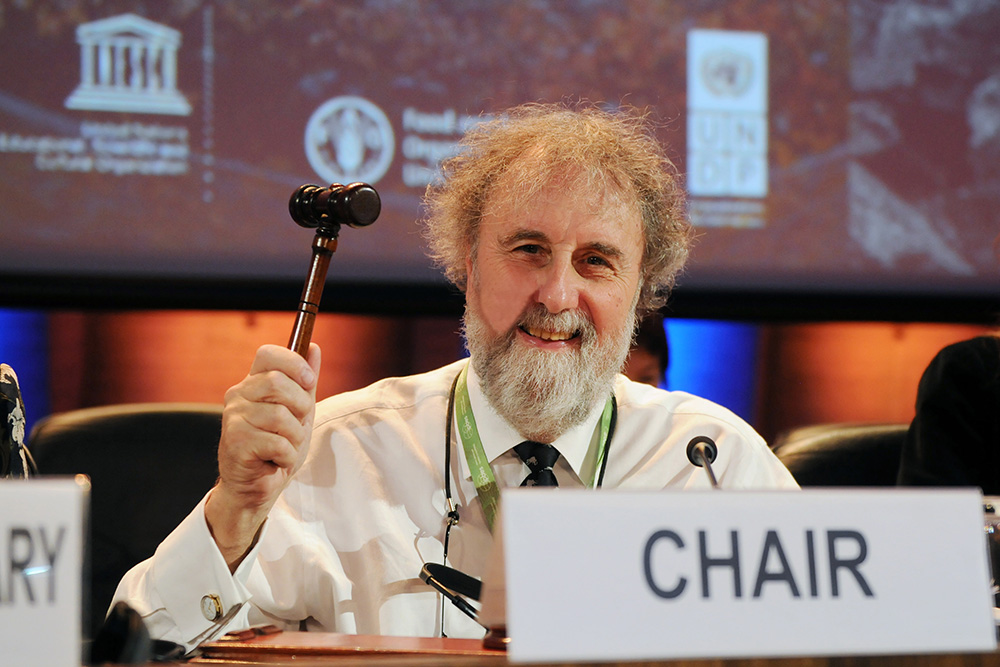
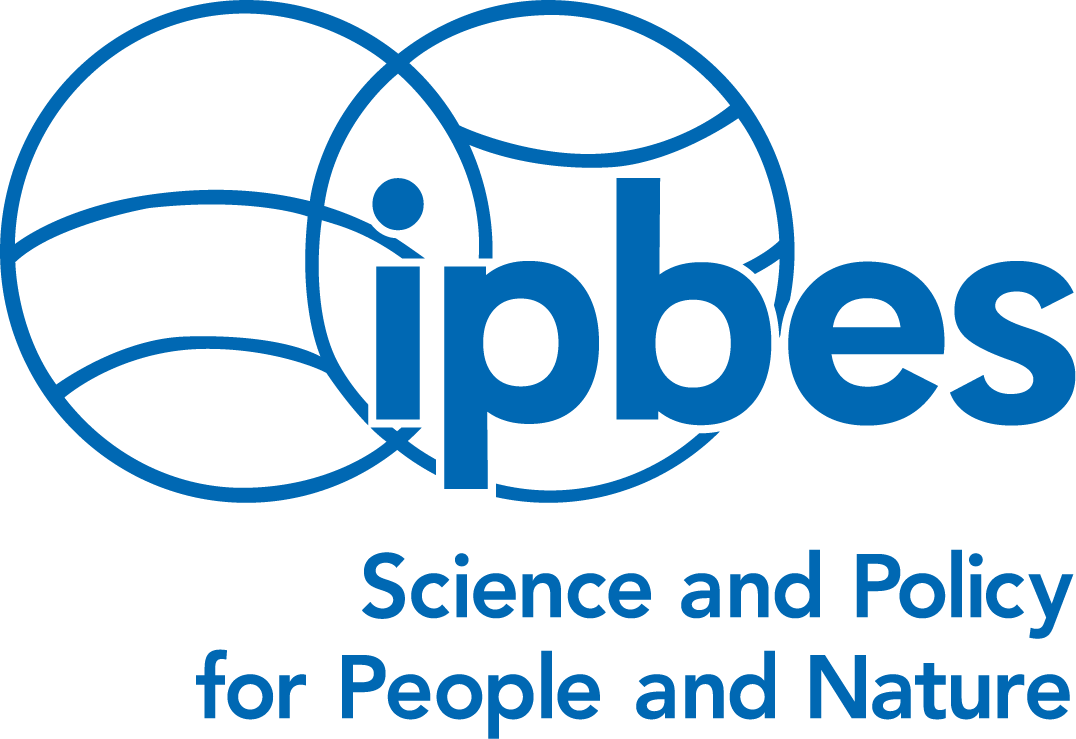 Highlights of the seventh session of the Plenary of the Intergovernmental Science-Policy Platform on Biodiversity and Ecosystem Services (IPBES-7), which was held from 29 April – 4 May 2019 in Paris, France, include:
Highlights of the seventh session of the Plenary of the Intergovernmental Science-Policy Platform on Biodiversity and Ecosystem Services (IPBES-7), which was held from 29 April – 4 May 2019 in Paris, France, include:
- approval of the summary for policy makers (SPM) and acceptance of the chapters of the Global Assessment on Biodiversity and Ecosystem Services, the first intergovernmental global assessment of this kind and the first comprehensive assessment since the Millennium Ecosystem Assessment (MA) released in 2005;
- adoption of the IPBES’s Rolling Work Programme up to 2030, including new assessments on: the nexus between biodiversity and water, food, and health; the determinants of transformative change; the impact and dependence of business on biodiversity; and a technical report on biodiversity and climate change intended to be prepared jointly with the Intergovernmental Panel on Climate Change (IPCC); and
- adoption of a response to the External Review of the Platform.
Delegates celebrated the finalization of the Global Assessment by giving standing ovations to the Contributing Lead Authors’ team and the Secretariat’s Technical Support Unit (TSU). They lauded the “enormous work” that had gone into the assessment and the “unprecedented scope and quality of the report.” Delegates described the assessment as a key milestone for IPBES as well as for international discussions on biodiversity. Others noted that IPBES has delivered on the most important objective of its first work programme by providing the most comprehensive assessment of global biodiversity to date. Many also highlighted its importance as input to the development of the post-2020 biodiversity framework. Delegates gave standing ovation to outgoing IPBES Chair Robert Watson for his outstanding contribution.
More than 150 leading experts from 50 countries collaborated to produce the Global Assessment, while additional contributors raised the number of experts to 400, from a wide array of natural and social sciences. The work lasted more than three years, drawing from 15,000 references, including scientific papers, government information, and additional relevant documents. In addition to scientific knowledge, the Global Assessment systematically included indigenous and local knowledge (ILK) to integrate all forms of knowledge.
The final report offers an overview of biodiversity and ecosystem trends and closely examines them in relation to key goals of the international environmental agenda, including the Sustainable Development Goals (SDGs), the Aichi Biodiversity Targets, and the Paris Agreement on climate change. It builds on previous IPBES Assessments, including the regional ones, the Pollinators’ Assessment, and the Land Degradation and Restoration Assessment. For more details, see the Earth Negotiations Bulletin (ENB) summary and analysis of IPBES-7.
IISD Reporting Services, through its ENB Meeting Coverage, provided daily web coverage, daily reports, and a summary and analysis report from IPBES-7.
Photos by IISD/ENB | Diego Noguera
For photo reprint permissions, please follow instructions at our Attribution Regulations for Meeting Photo Usage Page
Highlights for Monday, 6 May 2019

On Monday afternoon, the media community gathered at UNESCO headquarters in Paris, France, for the official launch of the Global Assessment Report on Biodiversity and Ecosystem Services. In her opening remarks, UNESCO Director-General Audrey Azoulay, welcomed the report, noting it provides a strong foundation for evidence-based action to address biodiversity loss.
Highlighting that several hundred experts spent over three years reviewing scientific literature and taking into account indigenous knowledge for the preparation of the report, IPBES Executive Secretary Anne Larigauderie highlighted that the Global Assessment is a “considerable gift from the scientific community.” She also noted that, especially through the negotiation of the summary for policy makers, the report is now “owned” by governments. Larigauderie underscored that while its conclusions are very alarming, the report also provides a message of hope: “if given a chance, nature will prevail, and everybody can contribute to halting biodiversity loss.”
Outgoing IPBES Chair Robert Watson noted that the report shows that halting and reversing biodiversity loss is not just an environmental, but also an economic, development, security, social, and ethical issue. He underscored the need to: foster sustainable agricultural practices; eliminate environmentally harmful subsidies; and fully engage indigenous peoples and local communities in the decision making process.
The Co-Chairs of the Global Assessment, Josef Settele, Sandra Díaz, and Eduardo S. Brondízio, summarized the key findings of the report, including:
- More species of plants and animals are threatened with extinction than at any other time in human history;
- The deterioration of nature has important negative consequences for human well-being;
- To address the root causes of biodiversity loss, we need to steer our financial and economic systems away from the currently limited paradigm of economic growth and better account for natural and social capital; and
- Bold action is urgently needed from the global to the local level.
In the ensuing question and answer (Q&A) session, the contributing experts to the Global Assessment responded to questions from media organizations such as Agence France Presse, Deutsche Presse Agentur, Associated Press, El País, Die Zeit, and France Inter. The Q&A inter alia addressed:
- Education for sustainable development;
- Knowledge gaps related to insect populations;
- Economic paradigm shifts;
- Regional variations in biodiversity trends;
- Some actors, such as those benefiting from fossil fuel subsidies, having a vested interest in preserving the status quo; and
- Actions that individual citizens can take to halt biodiversity loss.
The experts said that “we are only beginning to understand interlinkages between tipping points,” such as the loss of coral reefs and changes in Arctic and polar ecosystems, and underscored the important message that “biodiversity is declining everywhere.”
With one media outlet asking “why should people living in cities care about this report?,” the experts emphasized that everyone, including in large metropoles, relies on nature’s contribution to people, inter alia pointing to the role of urban green spaces with regards to air pollution, storm water regulation, and mental health.
The event closed with Robert Spaull, IPBES Secretariat, saying “this is not the end of the Global Assessment process, now we all have to make sure the report’s findings are taken up by decision makers and all other stakeholders.”
+ Visit the web coverage for Monday, 6 May 2019
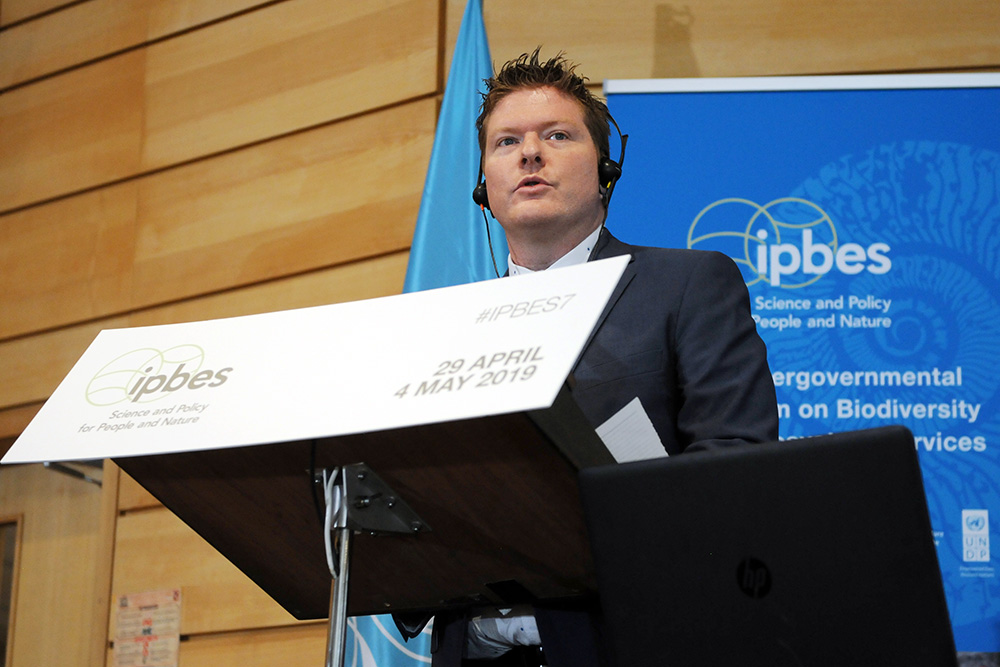
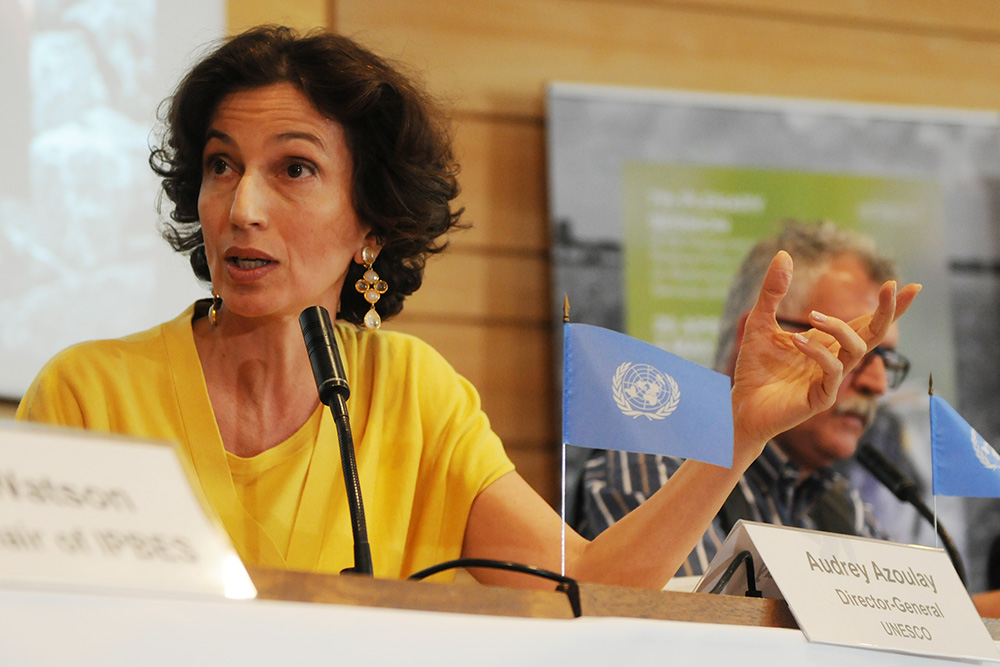
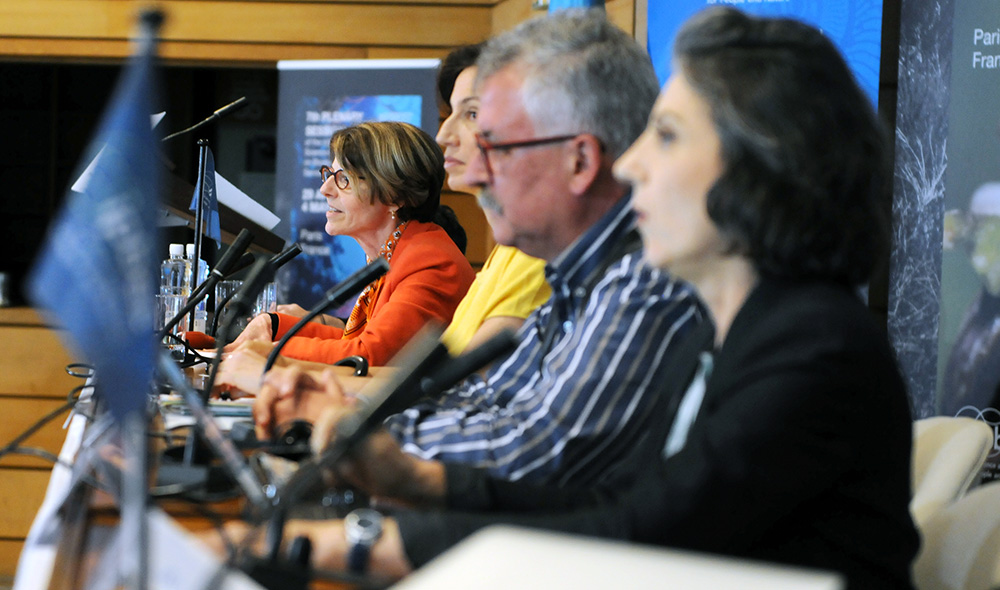
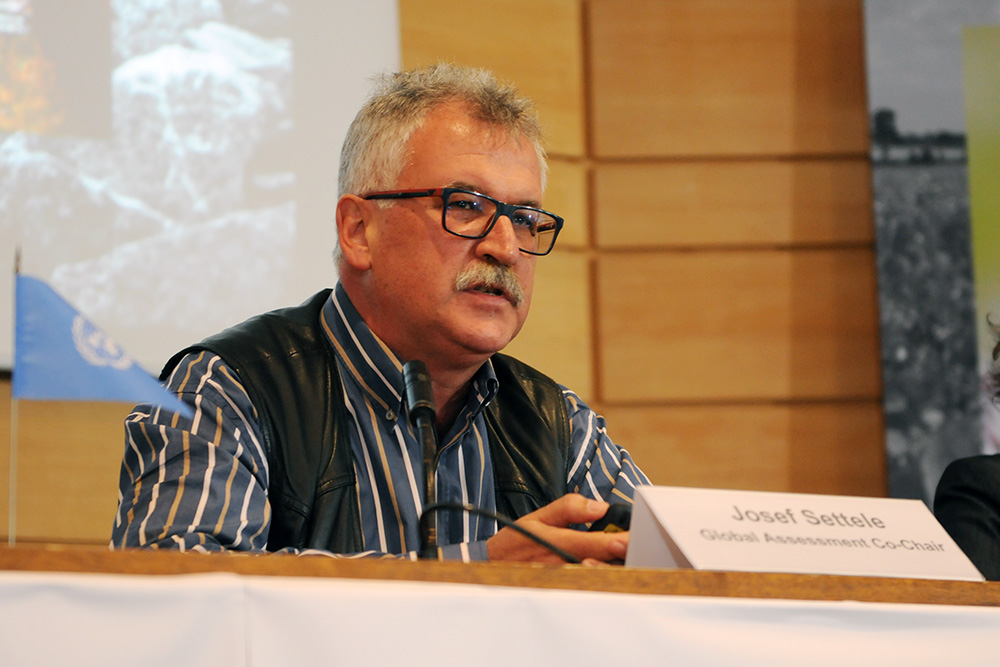
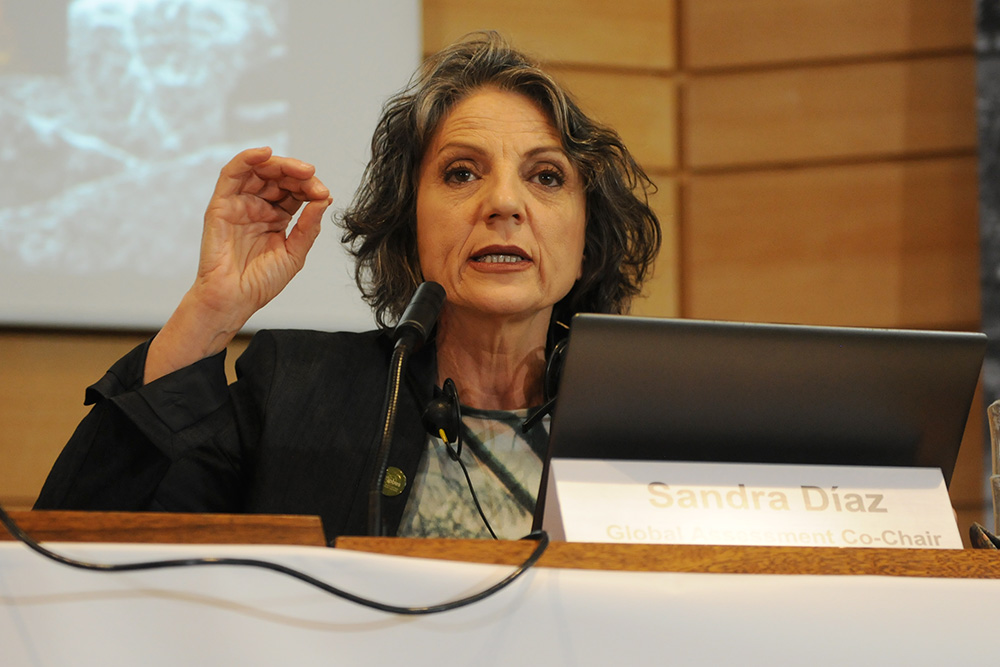
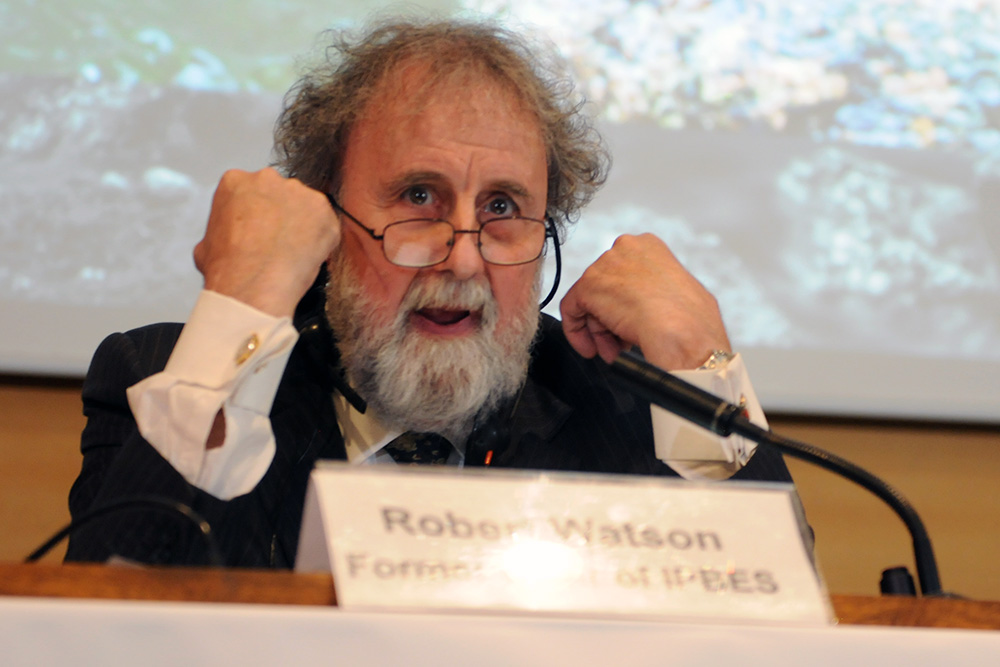
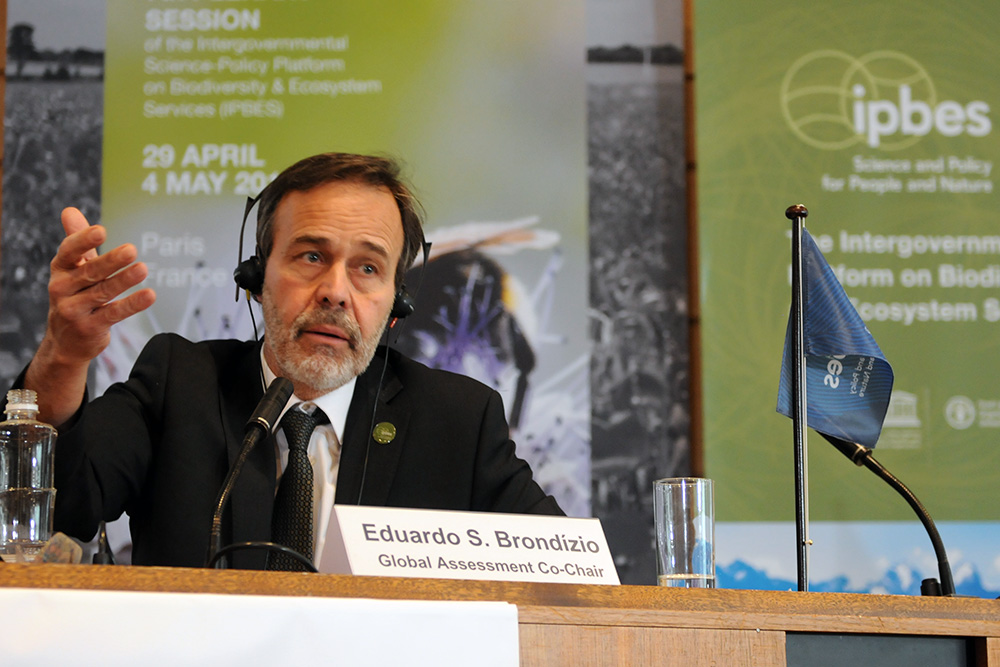
Highlights for Saturday, 4 May 2019
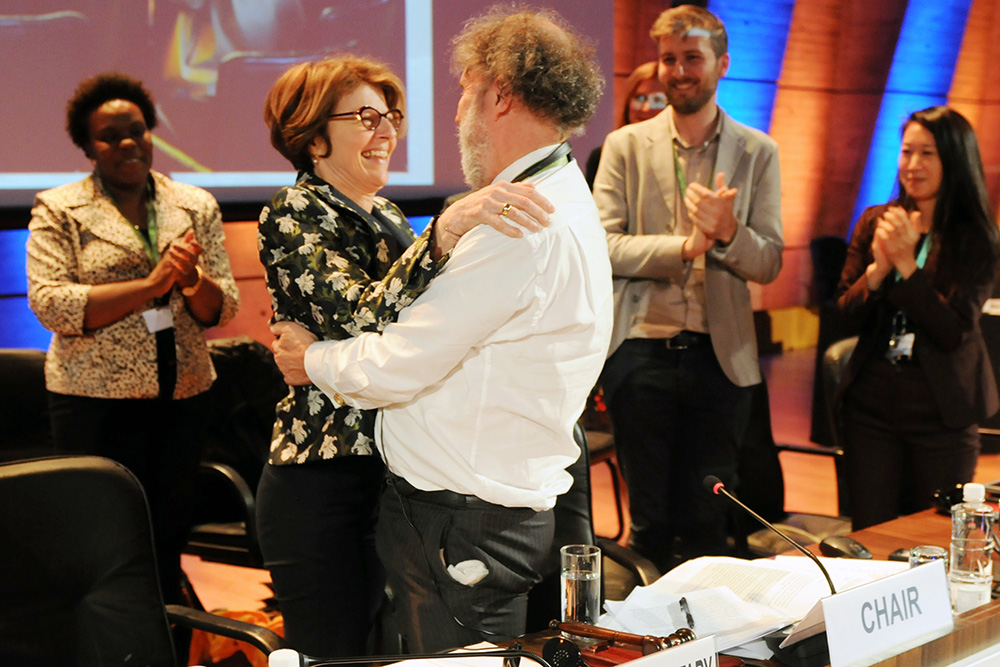
On Saturday morning, the working group on the Global Assessment recovened to review a table listing key knowledge gaps, which the group eventually agreed to add to the summary for policy makers (SPM) of the Global Assessment as an annex.
Plenary convened at 11:00 am. Delegates approved the SPM and accepted the chapters of the Global Assessment report without further amendments. They applauded the Chapter Lead Authors, Experts, and the Technical Support Unit involved in preparing the assessment. Plenary then adopted IPBES’ Rolling Work Programme up to 2030 and the budget, and elected new members to the Multidisciplinary Expert Panel and the Bureau. Plenary elected Anna Maria Hernández (Colombia) as new IPBES Chair, and delegates accepted Morocco’s offer to host IPBES-8 in early 2021.
CBD Executive Secretary Cristiana Pașca Palmer said biodiversity loss is destroying the “bedrock” of ecosystem services with dramatic economic and social consequences. She outlined forthcoming international biodiversity meetings towards the post-2020 biodiversity framework, noting they present an unprecedented opportunity to find a way forward.
IPBES Executive Secretary Anne Larigauderie called the assessment “a landmark report,” stressing that current trends do not allow much optimism, and highlighting that biodiversity is also a development, economic, and security issue. She called on participants to work together to make most of the current momentum for biodiversity.
In closing statements, Africa called for facilitating and monitoring the uptake of the Global Assessment’s outcomes. Asia and Pacific stressed the need for successful implementation of the adopted work programme. The Eastern European Region highlighted capacity building under the new work programme. Latin America and the Caribbean highlighted the technical paper on biodiversity and climate change. Western Europe and Others said that its members should use the Global Assessment to trigger decisions at all levels. The US said that IPBES’ efforts will serve and protect generations to come.
The UN Educational, Scientific and Cultural Organization (UNESCO), for the biodiversity-related conventions, underscored the importance of stronger alignment of IPBES with the biodiversity conventions, who in turn, should work to address synergies. The UN Convention to Combat Desertification (UNCCD) said understanding conservation and connectivity are “crucial.” The International Indigenous Forum on Biodiversity and Ecosystem Services (IIFBES) stated that IPBES is strengthened by inclusion of Indigenous Peoples and Local Communities (IPLCs) in all programmes. The Open-ended Network of IPBES Stakeholders (ONet) asked members to integrate outcomes into national agendas, into discussions at the UN General Assembly, and into the Rio Conventions.
In his farewell speech, outgoing IPBES Chair Robert Watson reminisced on his long history of involvement in environmental assessments, calling chairing IPBES his “most rewarding job.” He stated the Global Assessment gives the private sector and civil society the evidence they need for evidenced-based policy making.
He then gaveled IPBES-7 to a close at 2:58 pm.
+ Visit the web coverage for Saturday, 4 May 2019
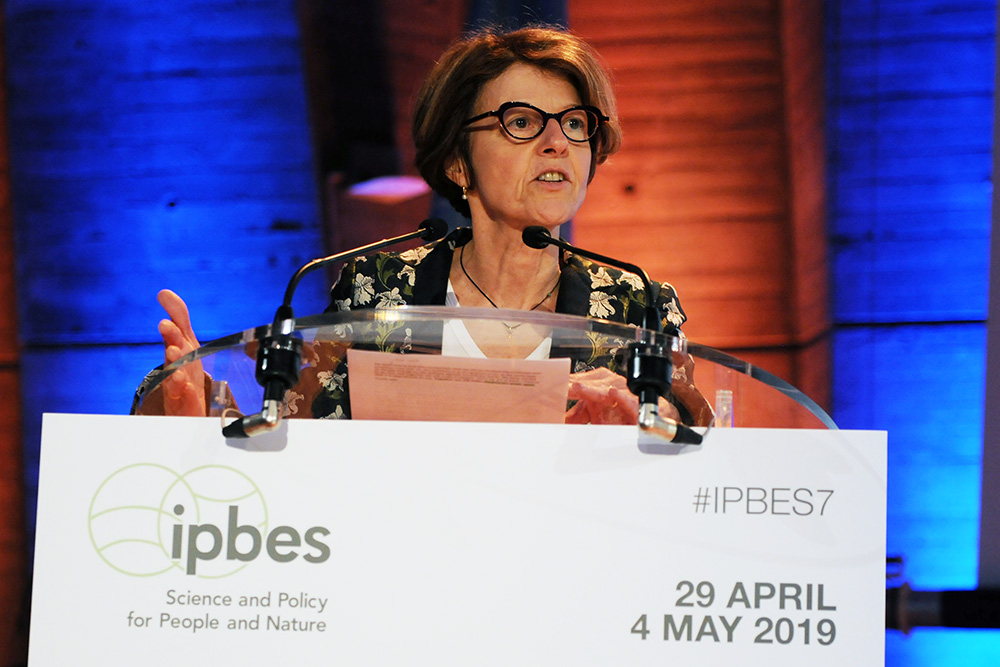
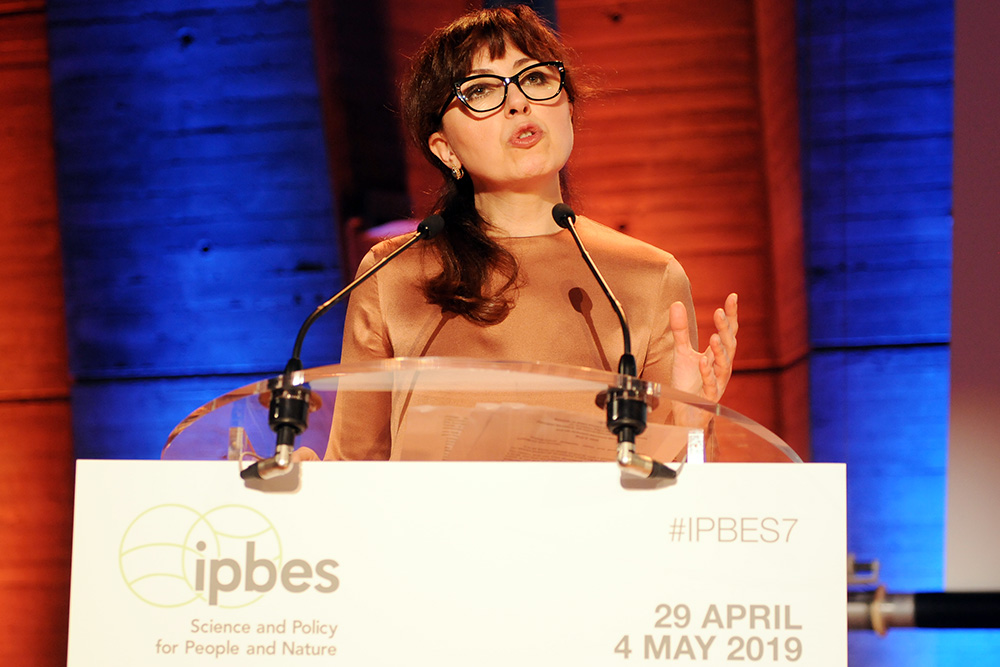
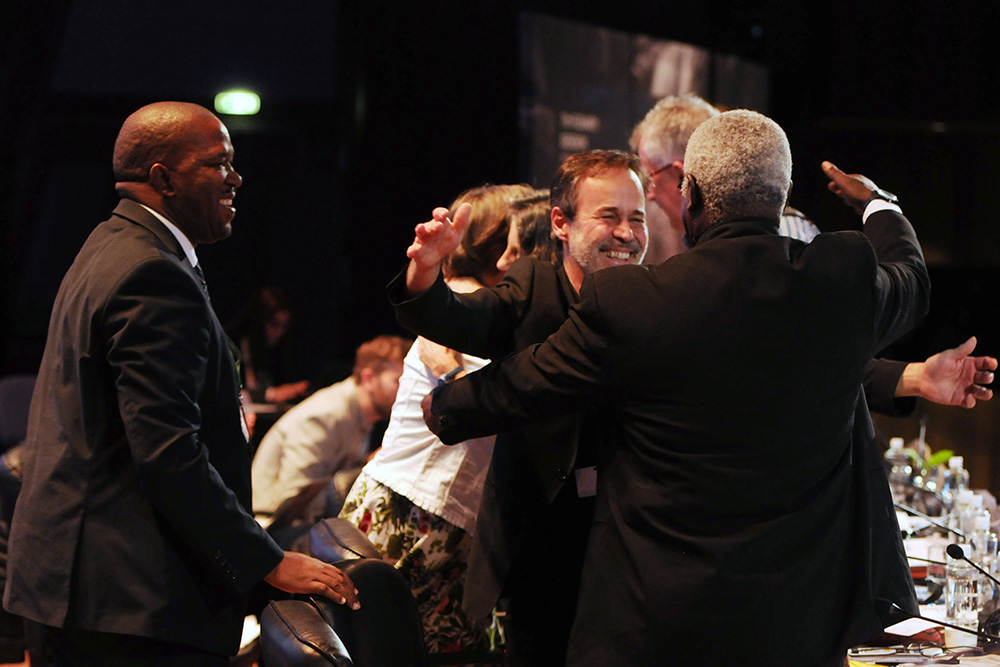
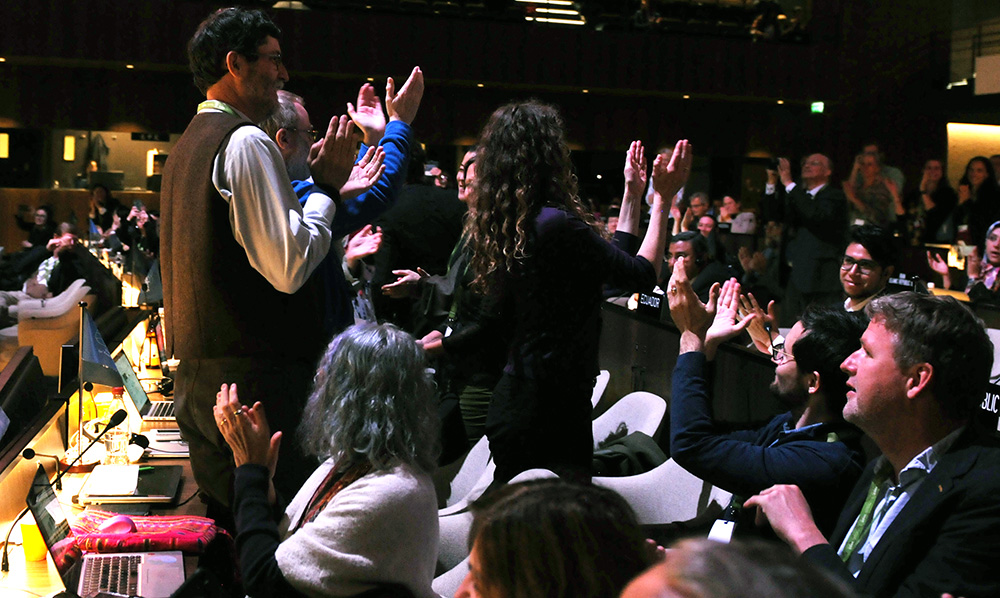
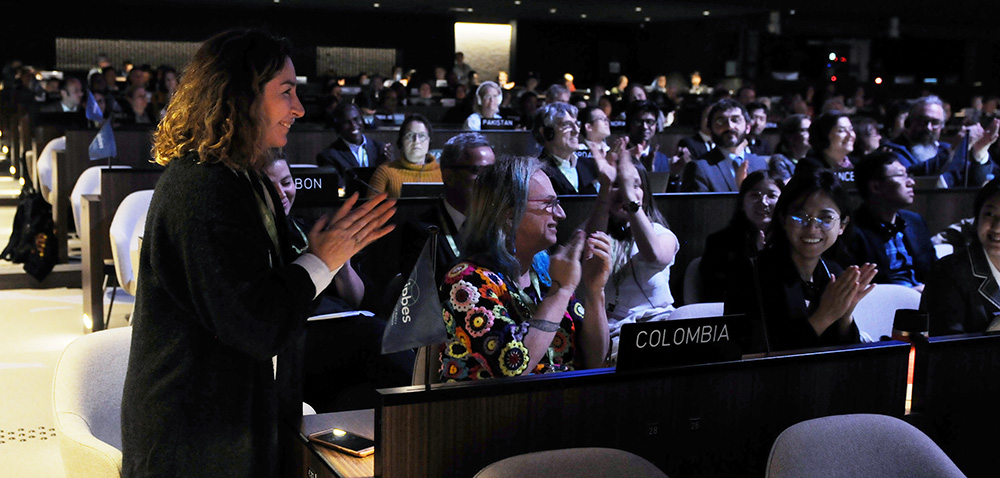
Highlights for Friday, 3 May 2019
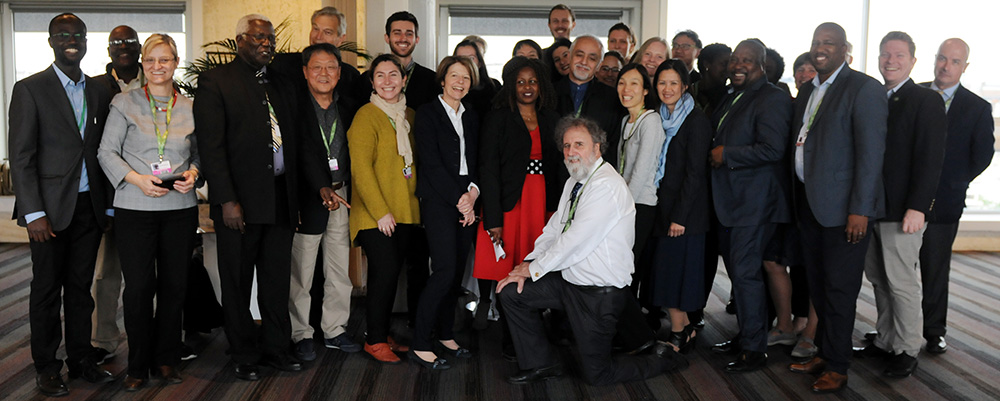
On Friday, IPBES-7 delegates continued negotiations in two working groups to finalize the summary for policy makers (SPM) of the Global Assessment and the Platform’s future work programme.
The working group on the Global Assessment continued discussing the SPM background section before returning to outstanding issues in the key messages. In the evening, they began considering a table outlining possible actions in the various areas addressed in the SPM.
Highlights of the working group on the Global Assessment included:
- A lengthy discussion on recognizing non-human rights, including animal rights and rights of nature. Opinions diverged regarding reference to internationally recognized rights, like the ones on Indigenous Peoples and Local Communities (IPLCs) versus the inclusion of non-human rights that are under active international negotiation.
- Extended debate on reducing consumption and waste, particularly among “the affluent,” as well as regarding the notion of social justice. Some delegates suggested referring to “changes” in consumption and waste rather than “reduction” and to social “equity” instead of social “justice.” This was followed by a lengthy discussion regarding circular economy, with delegates exchanging opinions on whether the concept of resource efficiency includes the idea of the circular economy.
- Recurrent discussions on various approaches to sustainable land management to be referenced in relation to the need to transform food systems and landscape management.
Delegates also discussed the need to avoid overloading the Secretariat with work by asking it to launch several scoping processes in parallel to ongoing assessments, and the need to maintain flexibility for IPBES to react to emerging issues. The working group on the future work programme agreed, after lengthy debate, on launching two assessment scoping processes on the nexus between biodiversity, water, food, and health, and on transformative change. The group also discussed at length how to invite the Intergovernmental Panel on Climate Change to engage in developing a joint technical publication on Biodiversity and Climate Change, preferably to be completed on time to inform discussions on the post-2020 biodiversity framework in late 2020. The eventually agreed to invite the Executive Secretaries of IPBES and IPCC to explore this issue.
For extensive details on the day’s negotiations and to hear what delegates said in the corridors, see our daily ENB.
+ Visit the web coverage for Friday, 3 May 2019
+ Read the ENB report for Friday, 3 May 2019 in HTML or PDF format.
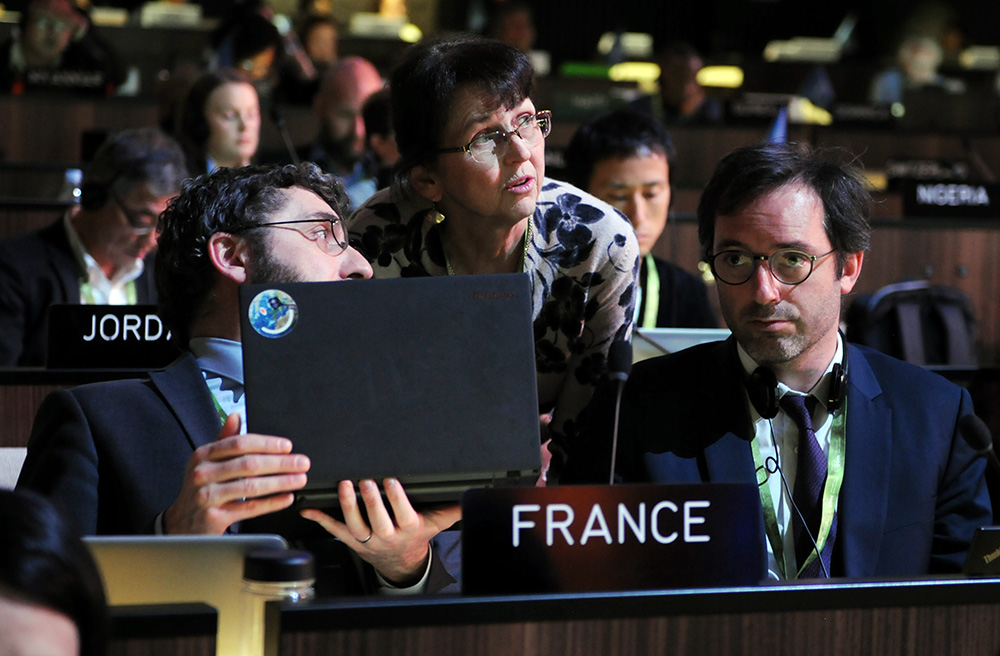
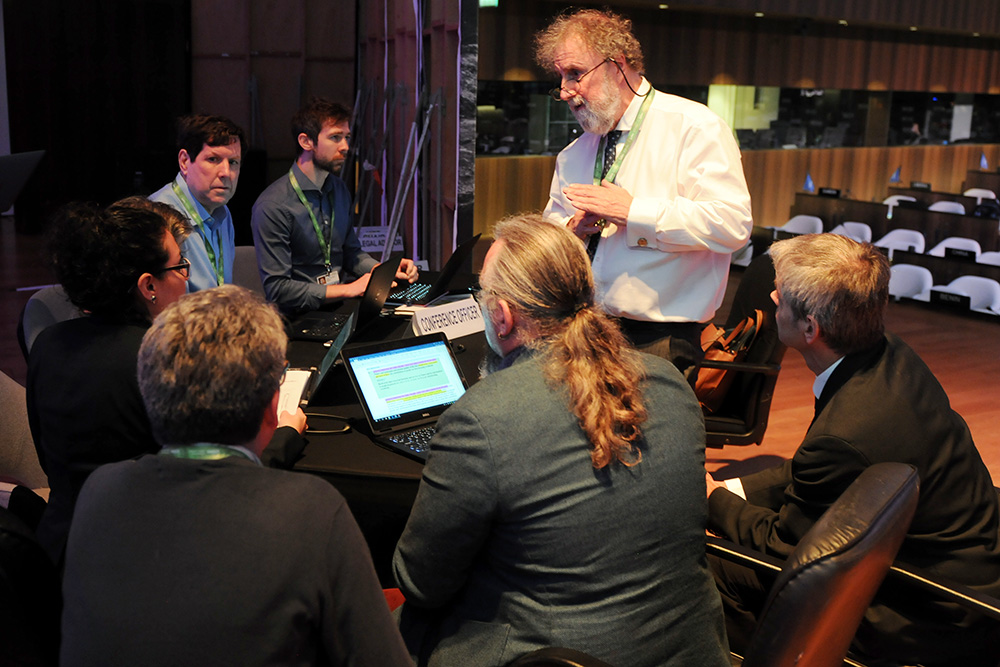
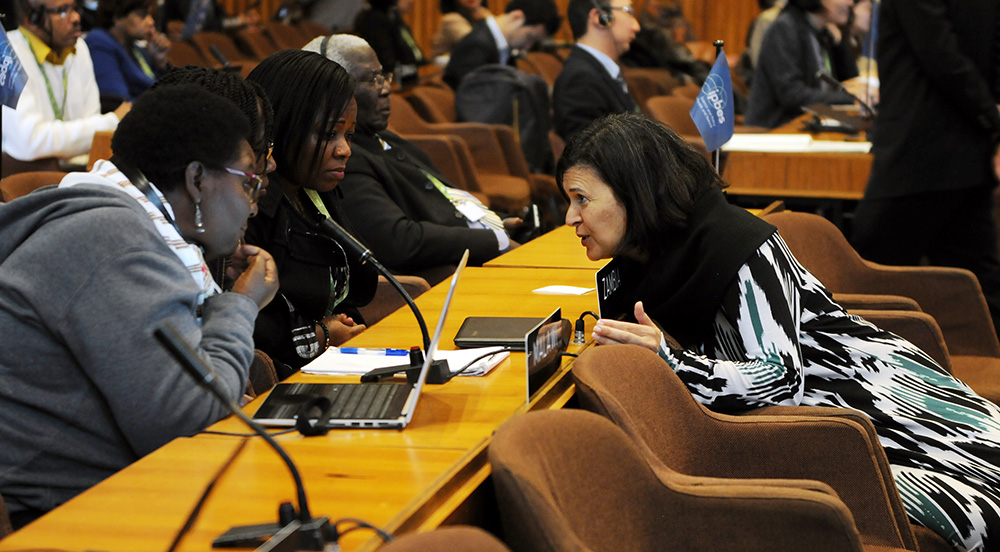
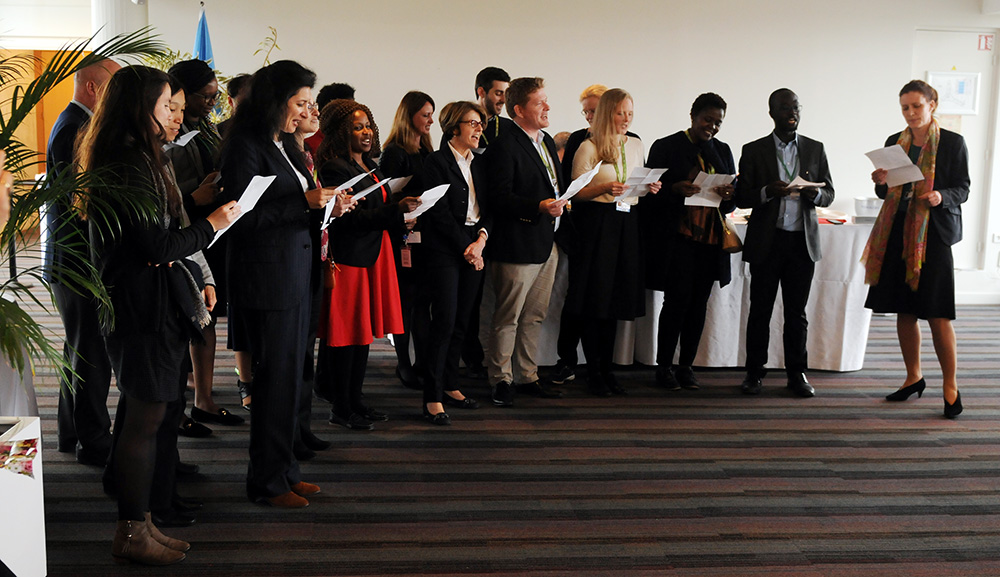
Highlights for Thursday, 2 May 2019
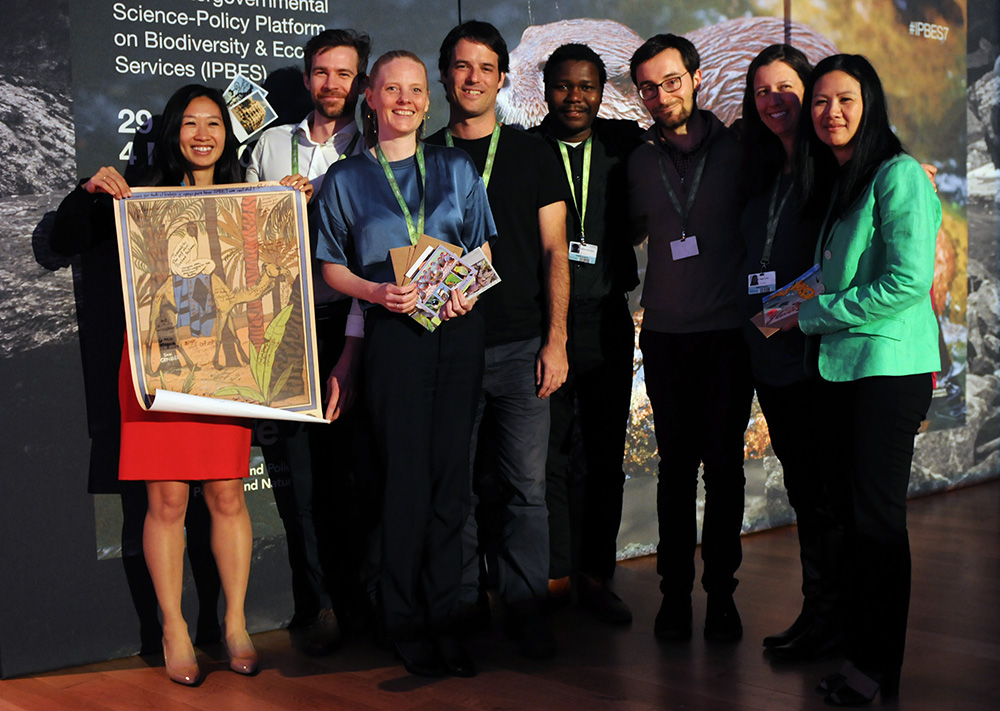
On Thursday, delegates continued negotiating the draft summary for policy makers (SPM) of the Global Assessment on Biodiversity and Ecosystem Services in a working group which met throughout the day and into the night. Another working group met throughout the day and in the evening to finalize the Platform’s second work programme.
The working group on the Global Assessment discussed key messages on simultaneously achieving nature conservation and other societal goals, such as food security, climate change mitigation, and sustainable economic development. In the afternoon, delegates completed the key messages section, except for several outstanding issues, and began considering the background section.
Highlights of these discussions included:
- Extended debate on referencing the rights of indigenous peoples and local communities (IPLCs) as a way to enhance nature conservation and restoration, while recognizing that indigenous peoples have different rights than local communities and that such rights are recognized in international law, but must be implemented through national law in most countries;
- Deliberations on whether to reference specific activities that can support nature conservation in key messages on food security, fisheries, and climate change mitigation; and
- A discussion on sustainable pathways and global financial and economic systems during which delegates debated whether economic systems must “evolve,” “reform,” or “transform” to conserve nature.
The second working group on the work programme up to 2030 resumed discussions on the objectives, making textual changes to the sections on capacity building, strengthening knowledge foundations, policy support, communicating and engaging, and reviewing effectiveness. With many noting that specific deliverables should be tailored to the priority topics and possibly be prepared by the task forces for consideration by IPBES-8, delegates agreed to remove references to “deliverables” and consider the elements in the draft work programme as objectives. Coming back to the issue of which topics to consider and what reports to prepare, they also debated: how to consider the topic of connectivity, which many Multilateral Environmental Agreements raised in the first call for inputs, and the need for follow-ups to the Global and Regional Assessments.
For extensive details on the day’s negotiations and to hear what delegates said in the corridors, see our daily ENB.
+ Visit the web coverage for Thursday, 2 May 2019
+ Read the ENB report for Thursday, 2 May 2019 in HTML or PDF format.
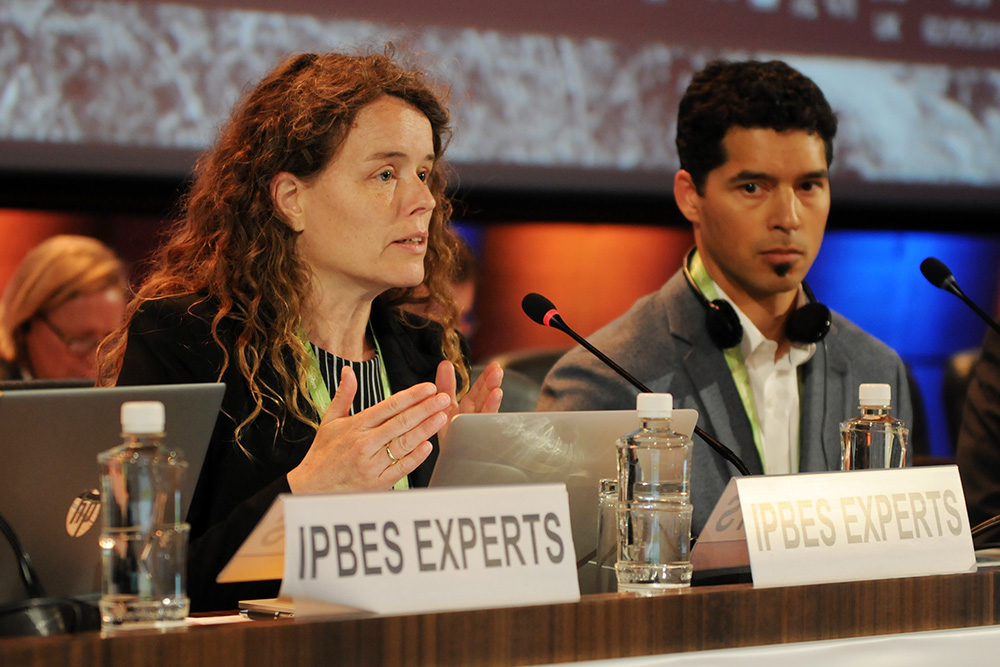
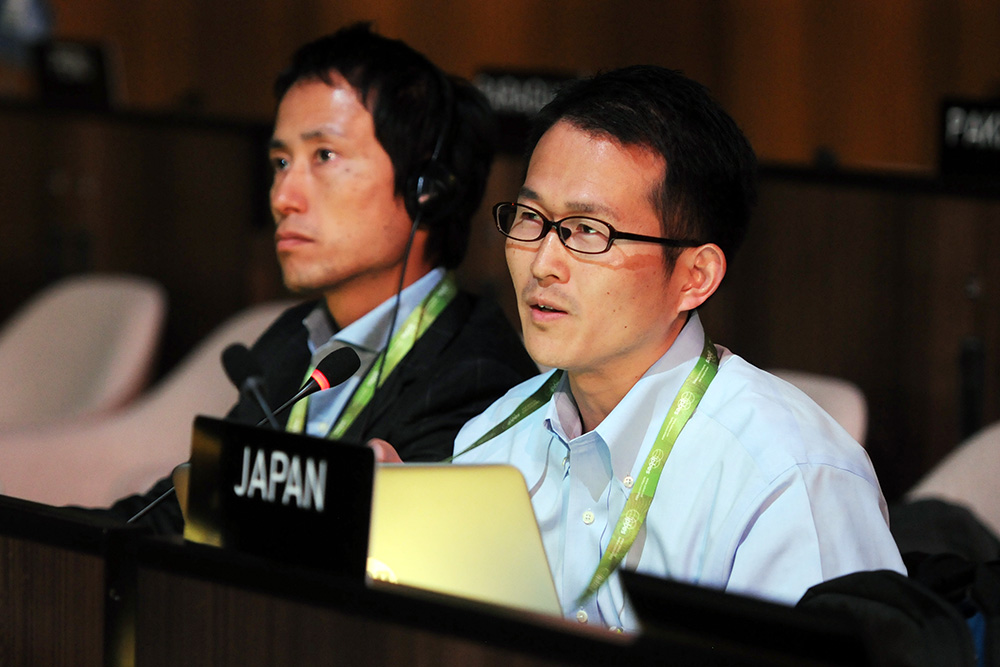
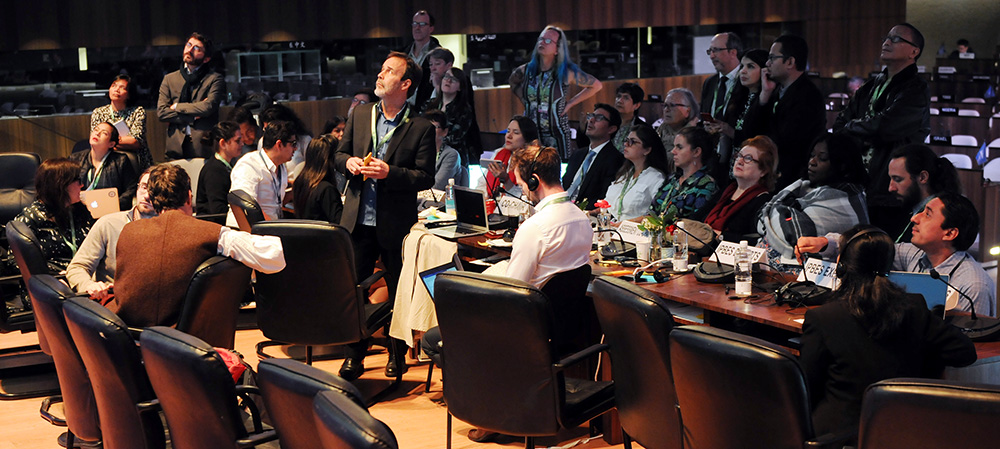
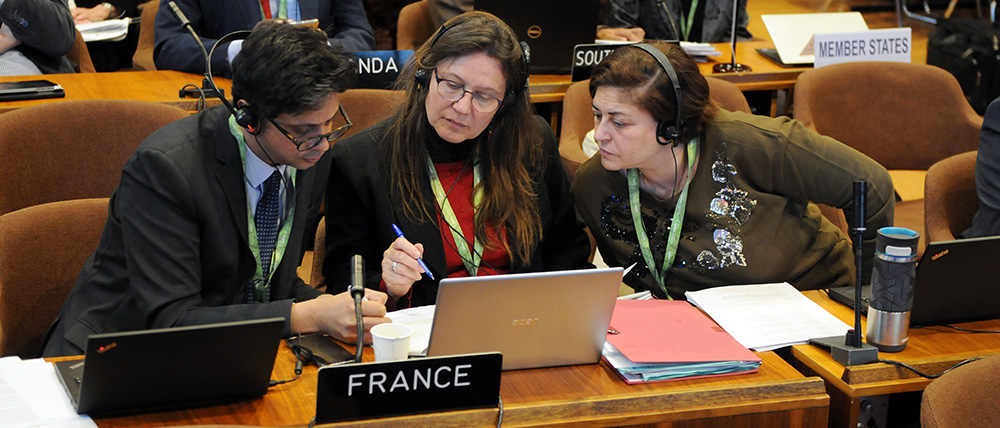
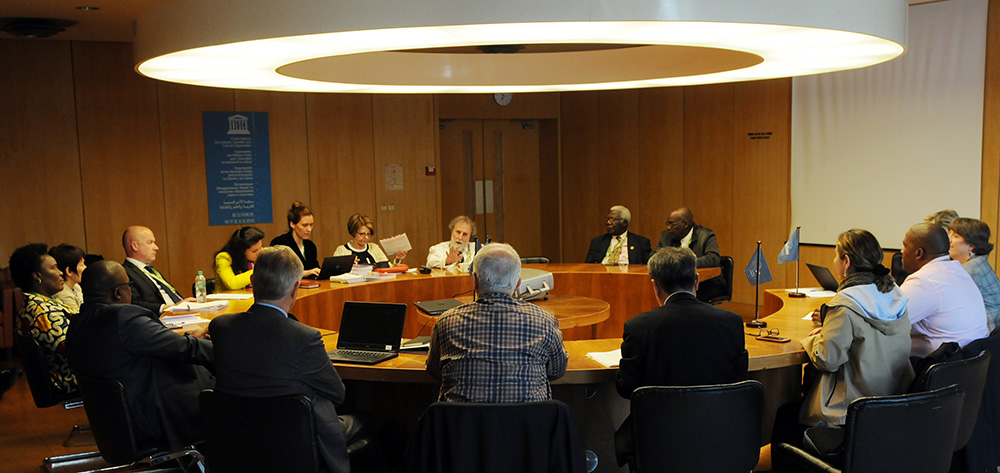
Highlights for Wednesday, 1 May 2019
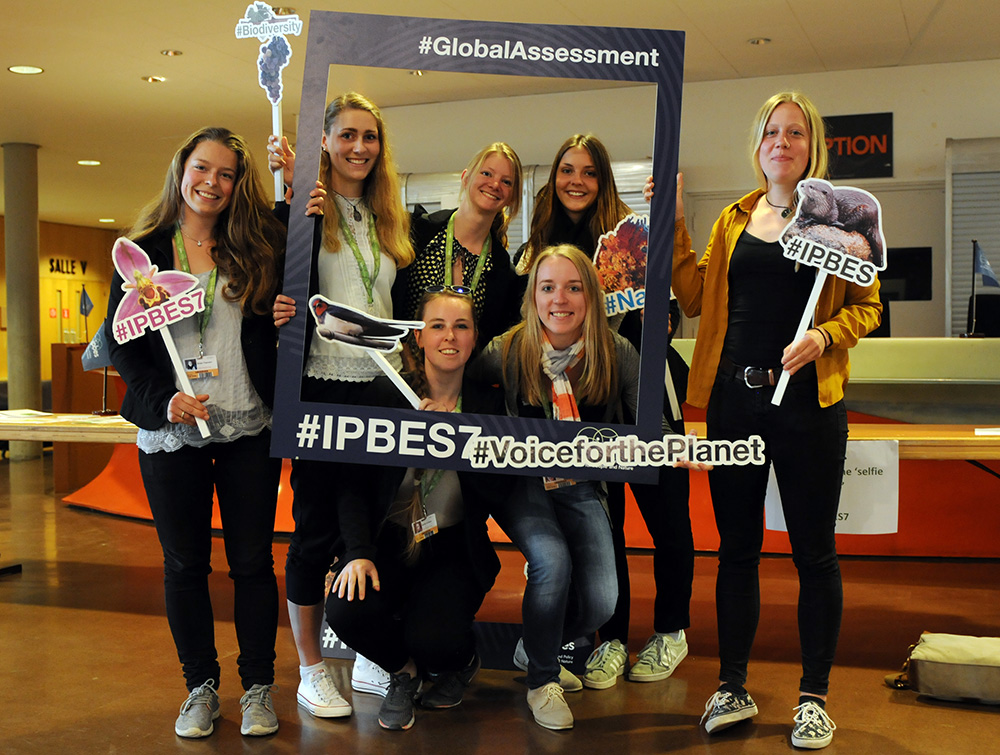
On Wednesday, IPBES-7 delegates met in a brief plenary to take stock of progress in the morning before continuing negotiating the summary for policymakers (SPM) of the Global Assessment in a working group. A second working group met in the afternoon to begin discussions on the Platform’s second work programme.
The discussion of the SPM focused on sections with key messages on drivers of changes in nature and on the prospects of achieving conservation of nature and sustainable development. Highlights of the working group included discussions on the following issues:
- References to human population growth and global trade as drivers of biodiversity decline and the role of consumption patterns and technological change in moderating impacts on natural systems;
- The relationship between unequal access to material goods and how inequality can lead to social conflict that impacts nature;
- The relationship between climate change and biodiversity loss;
- The appropriate way to describe the impact of economic incentives for harmful economic activities; and
- Transformative change as a strategy to achieve goals for conserving and sustainably using nature, and evidence from scenarios and models showing the impact of policy measures on the prospect for achieving such goals.
In the afternoon, a second working group began discussing the future work programme of the Platform, based on a proposal to prioritize three topics: promoting biodiversity to achieve the 2030 Agenda for Sustainable Development; understanding the underlying causes of biodiversity loss and determinants of transformative change to achieve the 2050 Vision for Biodiversity; and measuring business impact and dependence on biodiversity and nature’s contributions to people. Delegates exchanged views on which proposed assessment reports to prioritize, with many pointing to transformative change, as well as the reports addressing the nexus between biodiversity, water, food, and health on the one hand, and biodiversity and climate change on the other.
For extensive details on the day’s negotiations and to hear what delegates said in the corridors, see our daily ENB.
+ Visit the web coverage for Wednesday, 1 May 2019
+ Read the ENB report for Wednesday, 1 May 2019 in HTML or PDF format.
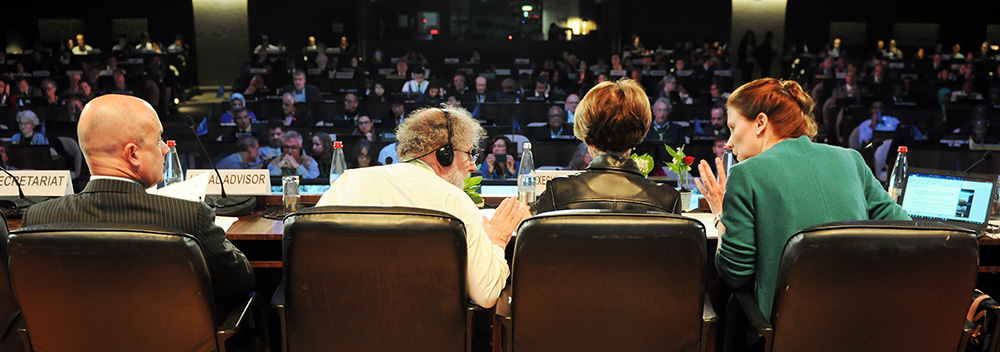
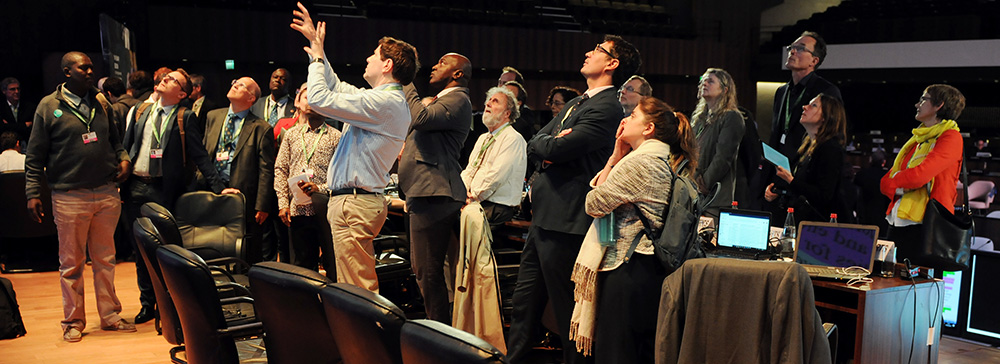
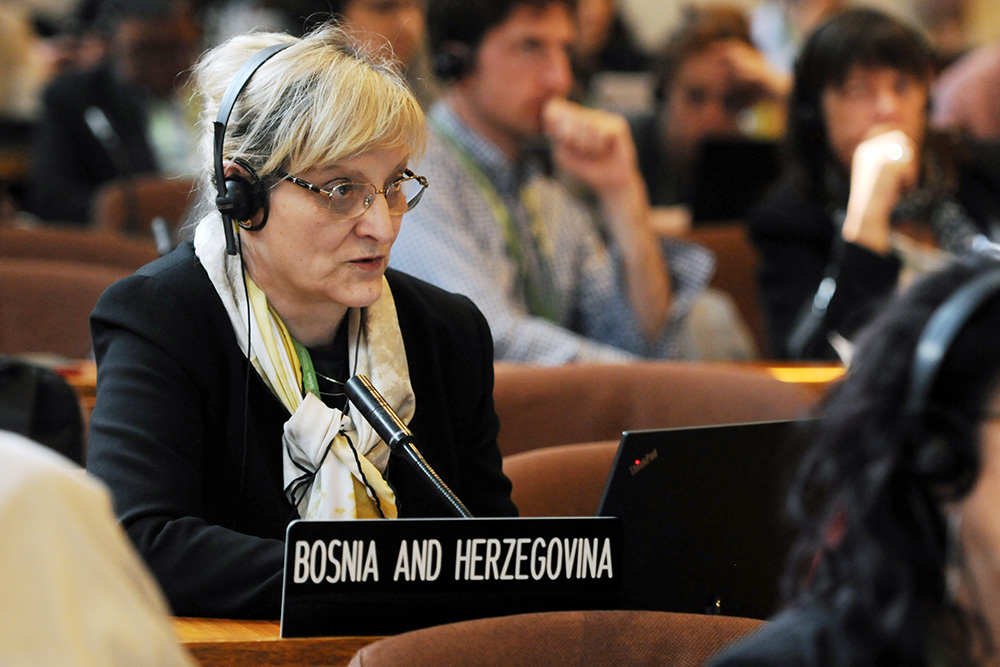
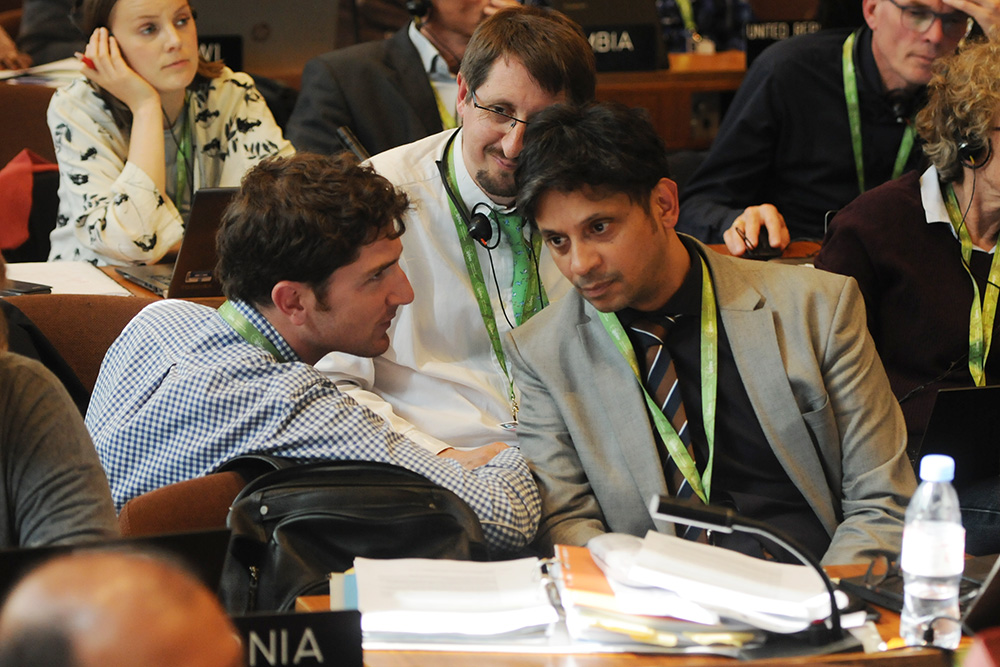
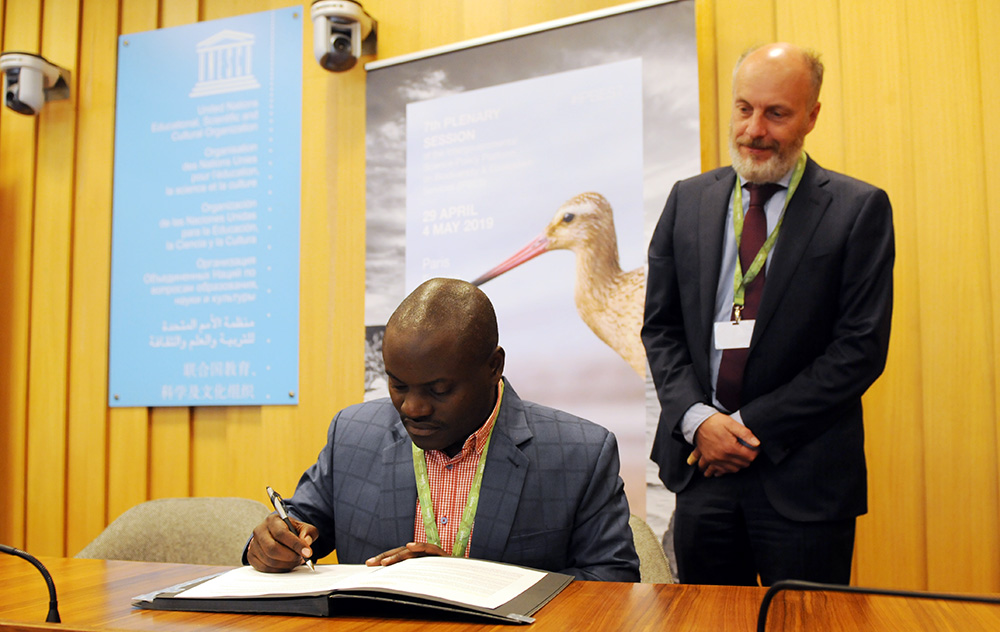
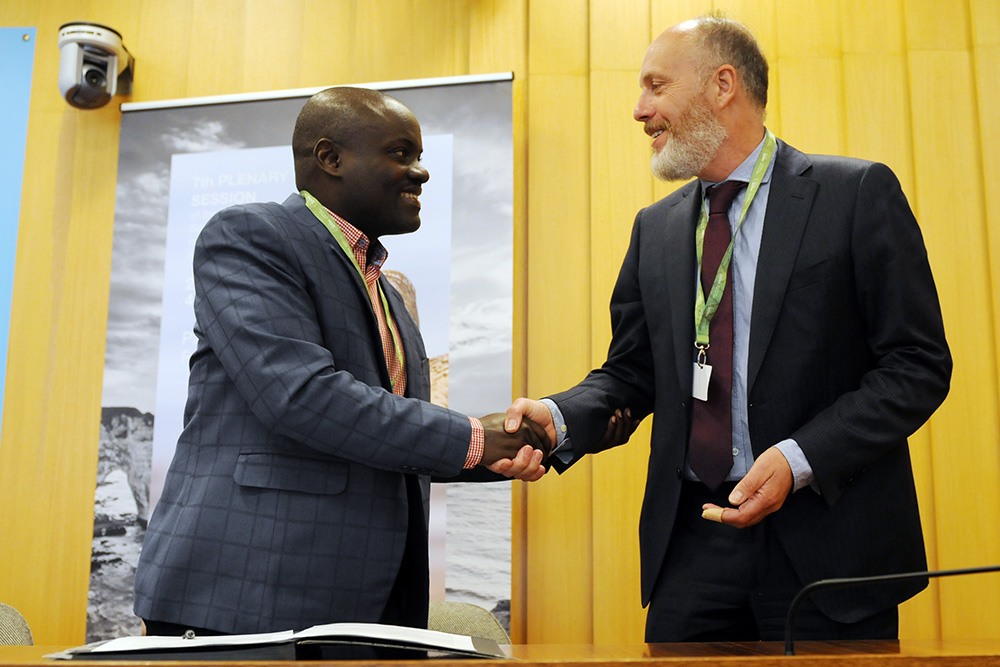
Highlights for Tuesday, 30 April 2019
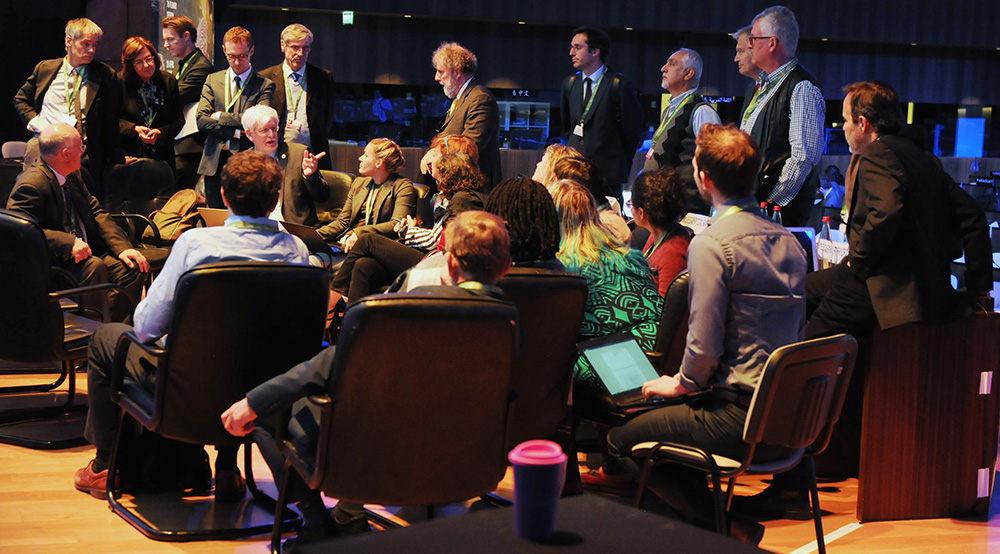
On Tuesday, IPBES-7 participants engaged in the discussions on the summary for policy makers (SPM) of the Global Assessment on Biodiversity and Ecosystem Services and discussed the response to the External Review of IPBES.
In general comments on the Global Assessment, delegates asked for clear and concrete messages as well as targets that are easily understood. They also suggested including regional messages and discussed ways to streamline and clarify the use of key concepts such as ecosystem services and nature’s contributions to people. Other comments focused on ensuring that large ecosystems, such as boreal forests and freshwater ecosystems, are appropriately referenced in the SPM. Following these general exchanges, the Working Group engaged in extensive discussions on how to characterize the extent and rate of decline of specific ecosystems and how to describe the state of domesticated animals and plants.
In the afternoon, a second Working Group considered how IPBES should respond to the comments received through the External Review of the Platform. Delegates debated based on a draft decision and a note prepared by IPBES Chair Robert Watson. The group initially agreed to consider a number of specific follow-up activities proposed in the Chair’s note, and began discussing the proposed development of an IPBES “vision, mission, and strategy,” but then reverted to considering only the elements contained in the draft decision. Much of the discussion focused on a perceived mismatch between the mandates of the Multidisciplinary Expert Panel (MEP), the Bureau, and the Secretariat, and the proposed requests addressed to them. Delegates eventually converged on an approach for taking the recommendations made by the Review Panel into account in implementing the work programme, including by identifying solutions for consideration by IPBES. They also converged on encouraging members and observers to use the findings and recommendations contained in the report to inform their decisions and other interactions with the Platform, and in supporting the implementation of its work programme. The Secretariat will prepare a revised draft decision on this agenda item for consideration by Plenary.
For extensive details on the day’s negotiations and to hear what delegates said in the corridors, see our daily ENB.
+ Visit the web coverage for Tuesday, 30 April 2019
+ Read the ENB report for Tuesday, 30 April 2019 in HTML or PDF format.
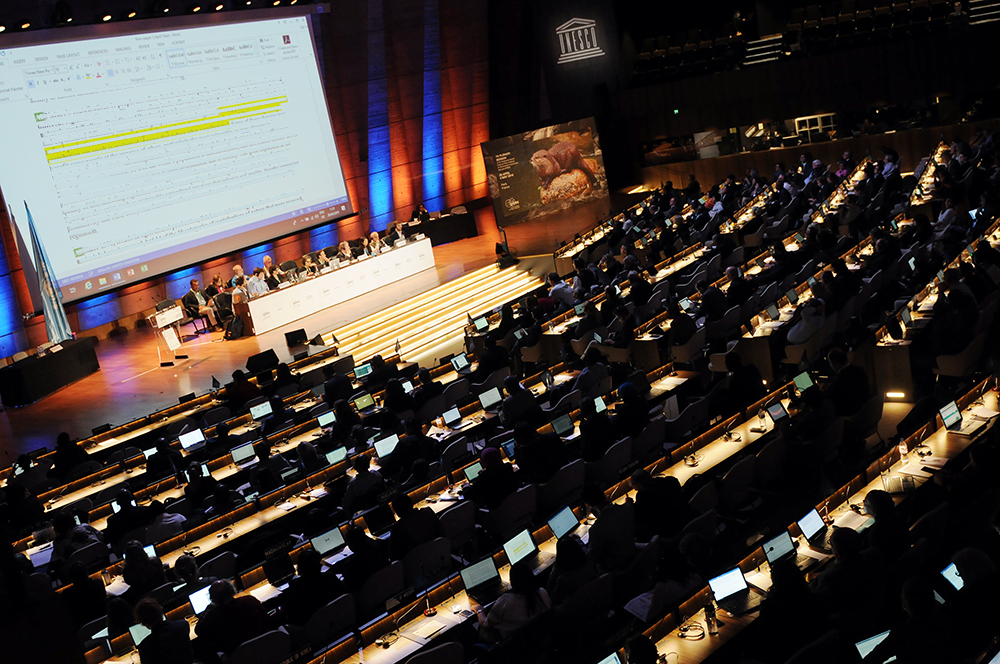
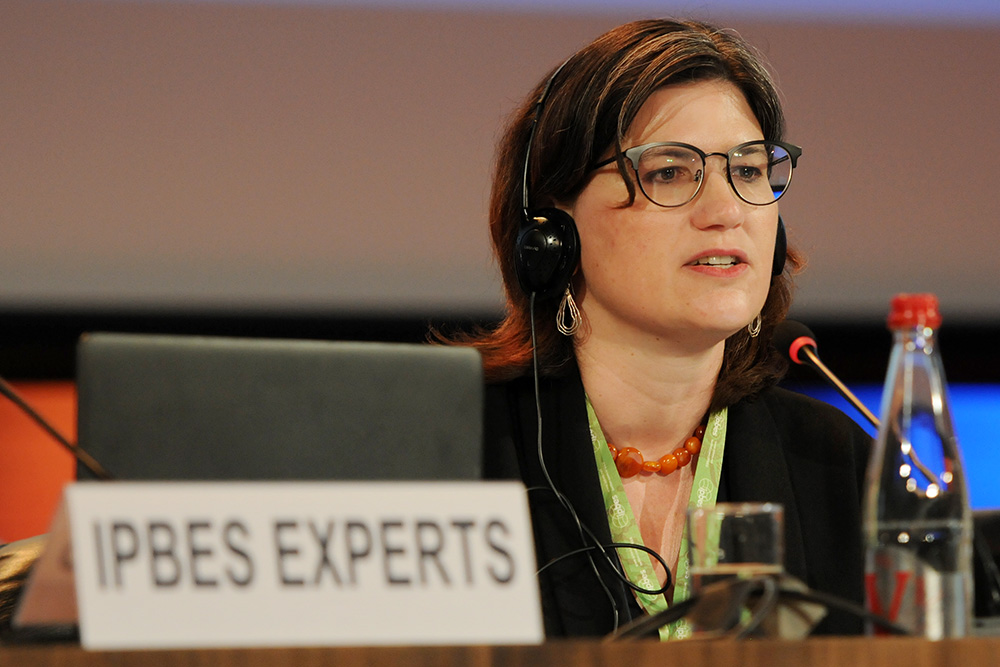
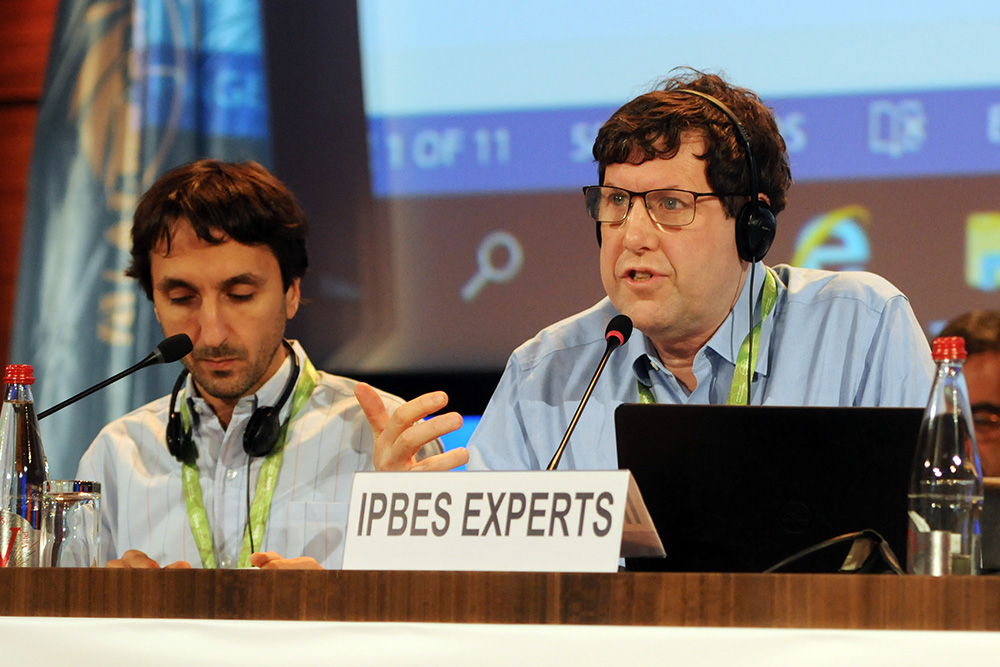
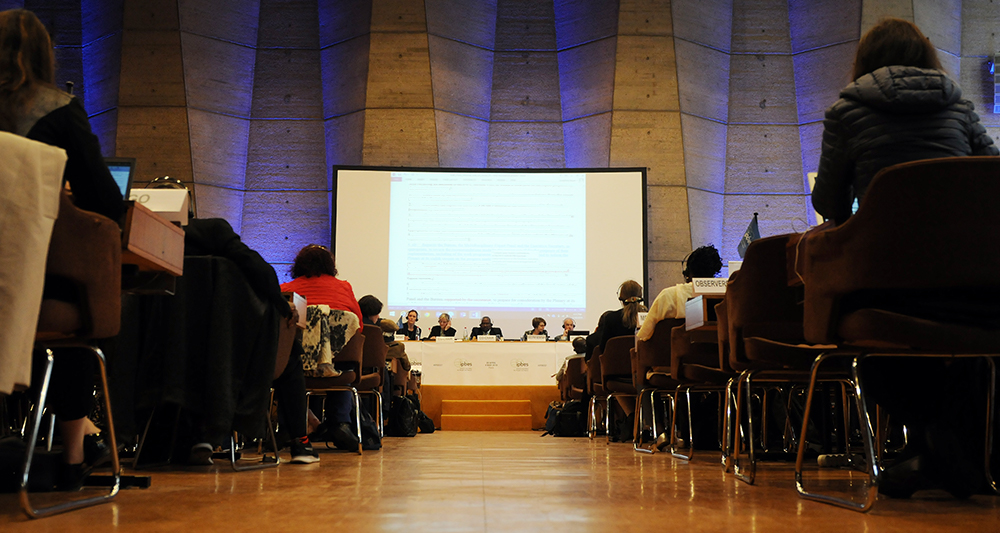
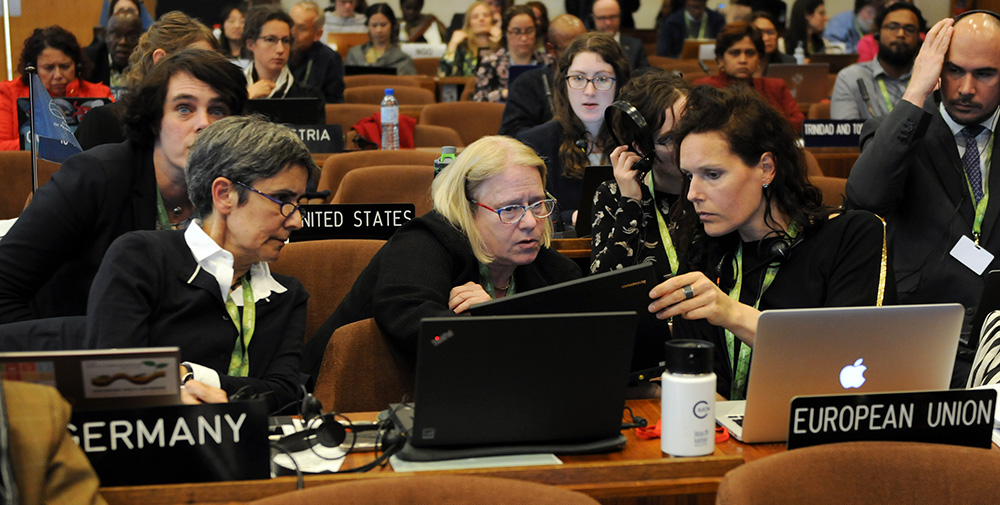
Highlights for Monday, 29 April 2019

IPBES-7 opened on Monday with a youth dance performance titled “Steps for a Change” that made references to biodiversity loss and pointed to interlinkages with climate change.
Opening the session, IPBES Chair Robert Watson noted that the Global Assessment is the first comprehensive intergovernmental biodiversity assessment since the Millennium Ecosystem Assessment in 2005, stressing it provides evidence for informed action by governments, private sector, and civil society.
Audrey Azoulay, UNESCO Director-General, stressed alliances between science and youth, disseminating messages more broadly to civil society, and addressing challenges of economic development.
IPBES Executive Secretary Anne Larigauderie said the Global Assessment will not only highlight the importance of biodiversity conservation for attaining the SDGs, but also address the intangible contribution of biodiversity to our identity and cultural heritage.
Laurent Stéfanini, Permanent Delegate of France to UNESCO, recalled that, in 2005, then President Jacques Chirac called for creating an intergovernmental expert platform on biodiversity and highlighted that the Global Assessment will shed light on the urgency of addressing biodiversity loss.
In the evening, François de Rugy, French Minister for the Ecological and Inclusive Transition, welcomed delegates to Paris. He stressed the need to prepare “for the crucial rendez-vous” with biodiversity that will take place in 2020 when the CBD COP will decide on the post-2020 biodiversity framework. He outlined national efforts to address biodiversity loss and stressed that “we can still win, but alas, also lose if we do not act. The choice is ours.”
Evening Reception
Bruno David, Director of the National Museum of Natural History, stressed that we need to preserve biodiversity not only for ethical or aesthetic reasons, but also because “it is our best insurance for the future,” underscoring the need for political action for the sake of future generations.
Emmanuelle Wargon, State Secretary at the Ministry for the Ecological and Inclusive Transition, France, stressed the need for ambitious policies at the national level to drive strong strategies internationally. She emphasized the “ambitious and comprehensive” French National Biodiversity Strategy, noting it has increased public awareness on biodiversity, thus allowing optimism for the future.
Brune Poirson, State Secretary at the Ministry for the Ecological and Inclusive Transition, France, emphasized that France is doing everything in its power to protect nature and build an international agenda for biodiversity that is as powerful as the one on climate change. She emphasized the need to transform our economic systems and bring more “love” into our work. Underscoring that there is one year left to build a strong framework for biodiversity at the international level, she stressed that now is the time to translate science to policy for public actions.”
IPBES Executive Secretary Anne Larigauderie thanked all speakers for the powerful and inspirational messages, highlighting the connection between biodiversity and climate change.
For extensive details on the day’s negotiations and to hear what delegates said in the corridors, see our daily ENB.
+ Visit the web coverage for Monday, 29 April 2019
+ Read the ENB report for Monday, 29 May 2019 in HTML or PDF format.
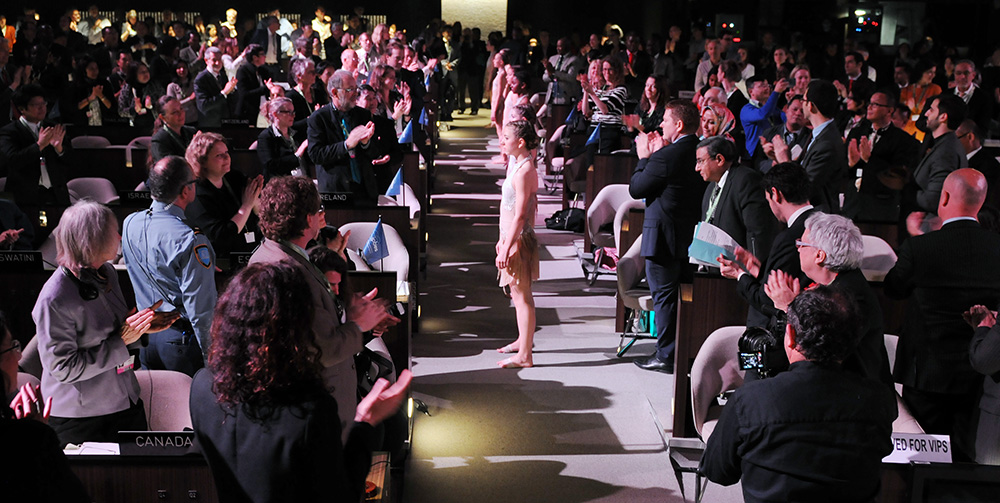
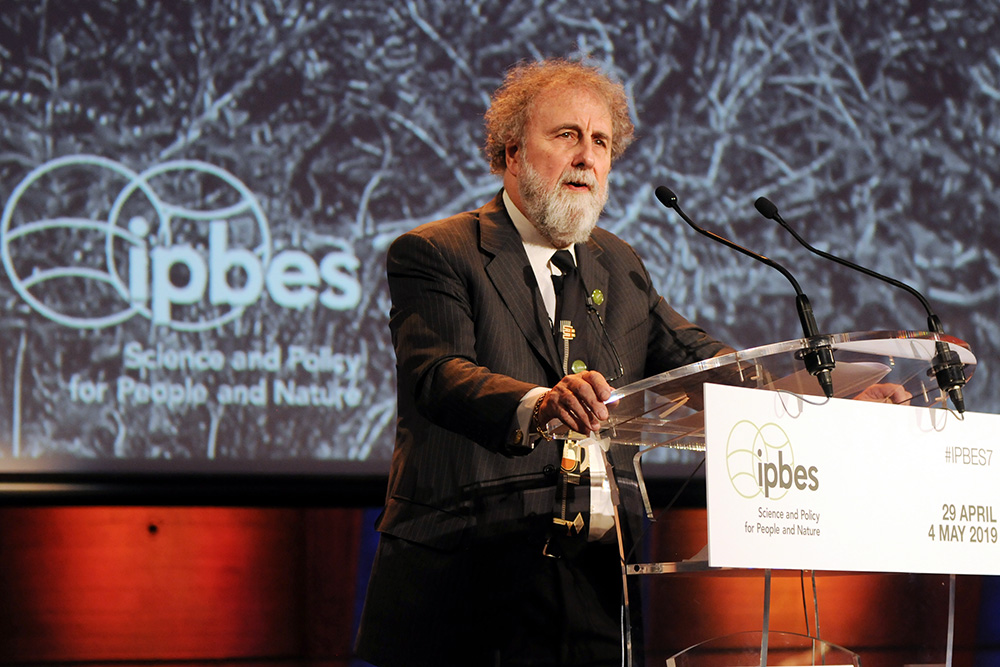
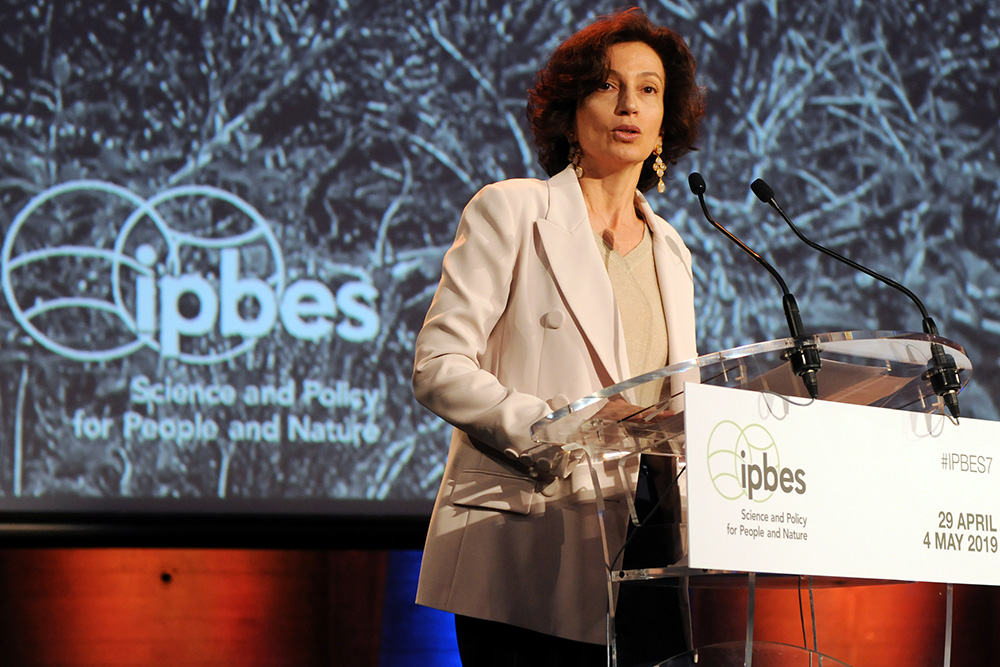
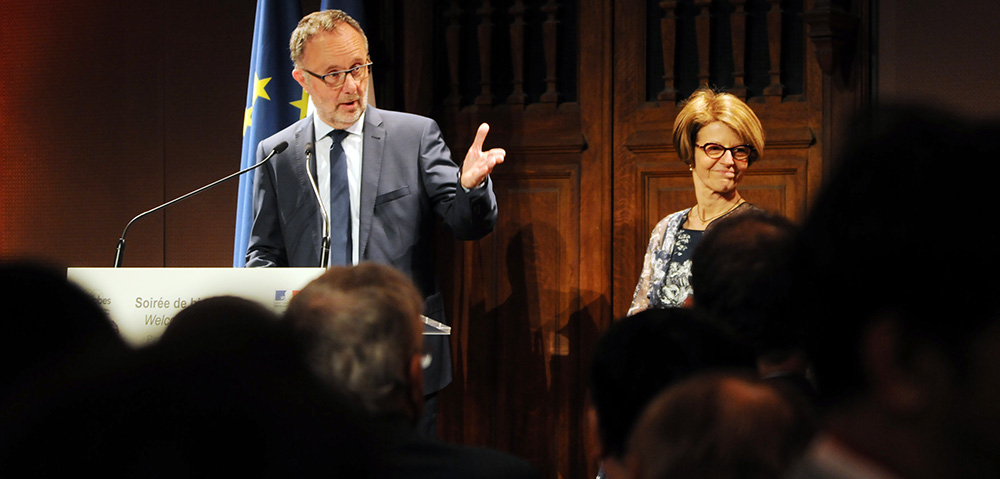
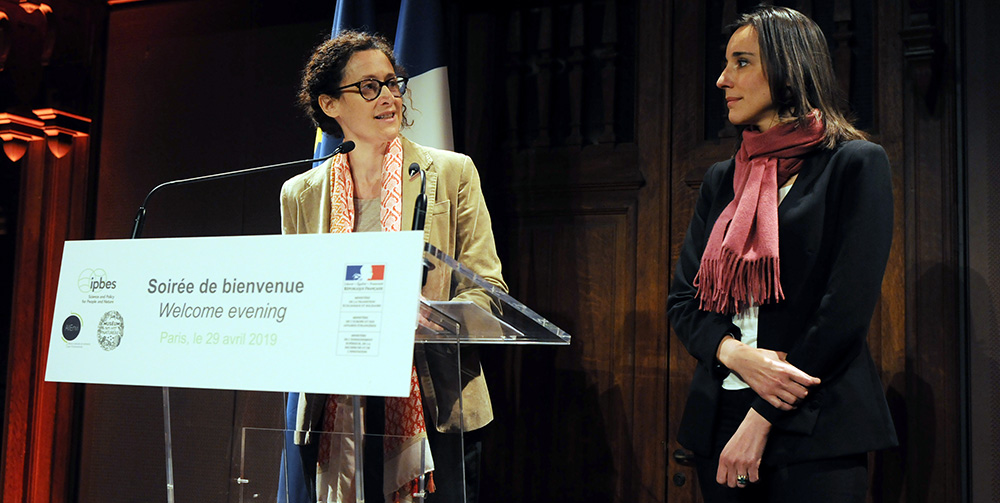
Highlights for Sunday, 28 April 2019
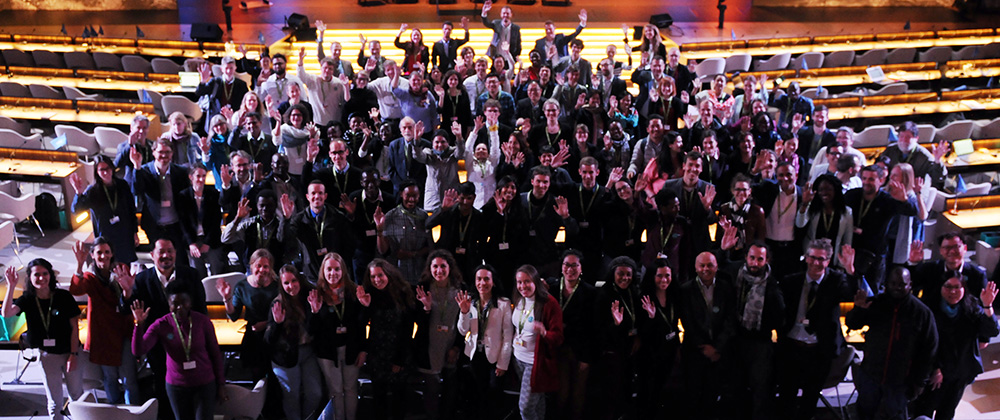
On IPBES-7 Stakeholder Day, participants exchanged views and experiences about their engagement in IPBES processes, including their own initiatives to support IPBES, and discussed: the process to develop the Global Assessment on Biodiversity and Ecosystem Services; priorities for the second work programme of IPBES; and ways to enhance stakeholder engagement during the second work programme.
Presentations on stakeholders’ activities in support of IPBES included:
- The French Foundation for Research on Biodiversity’s work to communicate biodiversity research and develop partnerships with businesses;
- Act4nature, an initiative aimed at mobilizing businesses for biodiversity conservation by asking CEOs to commit to include biodiversity considerations in their development strategies and report on implementation;
- Progress made by the IPBES Capacity Building Taskforce in supporting the development of national platforms and regional and national assessments;
- Experiences from several organizations and countries in establishing national platforms and conducting regional and national assessments, including the UN Environment Programme - World Conservation Monitoring Centre (UNEP-WCMC), Europe and Central Asia Network, Cameroon, Brazil, and South Africa; and
- An initiative from Mexico to engage Indigenous Peoples and Local Communities on IPBES and the cultural adaptation of IPBES deliverables.
Transformative change emerged as a cross-cutting issue in several sessions during the day. During an information session on the process and methodology of the Global Assessment, several participants noted that the Global Assessment, like all previous IPBES assessments and similar reports from other organizations, underlines the need for immediate action to transform the relationship between humans and nature, asking how IPBES can support this transformation. In the discussion on the second work programme, participants supported transformative change as a priority for future IPBES work along with work on the interlinkages between climate change and biodiversity loss. In a panel discussion on enhancing stakeholder engagement during the second work programme, one speaker highlighted that the external review of IPBES has shown that transformative change can only be achieved if all four functions of IPBES are implemented, including assessments, policy support, capacity building, and communication and outreach. He suggested that transformative change should not be an assessment topic, but should be “in everything IPBES does.”
Following these discussions, stakeholders coordinated their inputs and statements on the Global Assessment and other items on the agenda of IPBES-7, including the Platform’s second work programme and follow up to the external review.
For extensive details on the day’s negotiations and to hear what delegates said in the corridors, see our daily ENB.
+ Visit the web coverage for Sunday, 28 April 2019
+ Read the ENB report for Sunday, 28 May 2019 in HTML or PDF format.
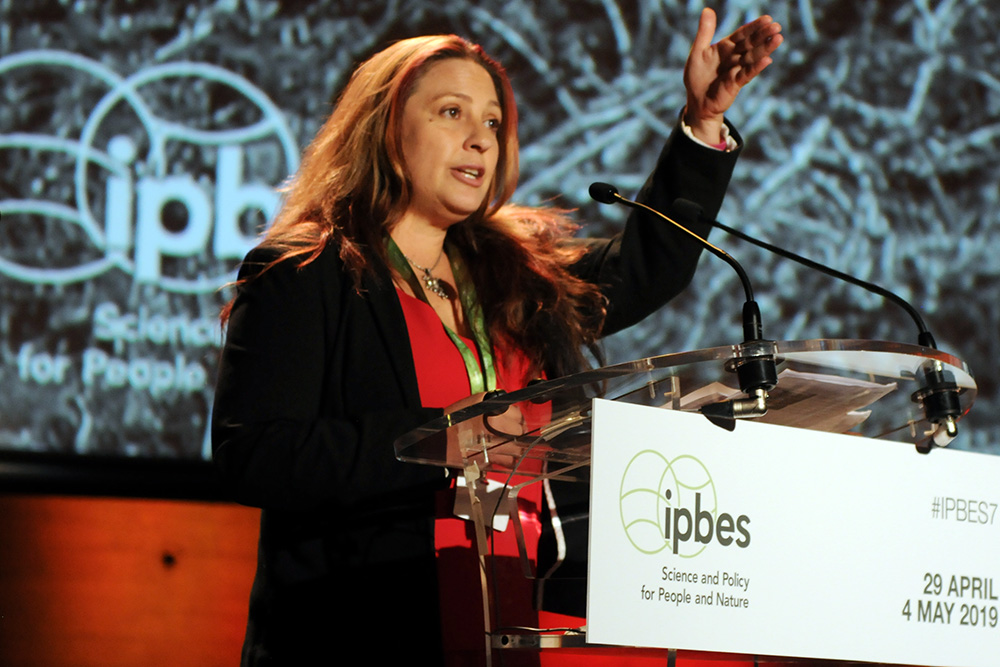
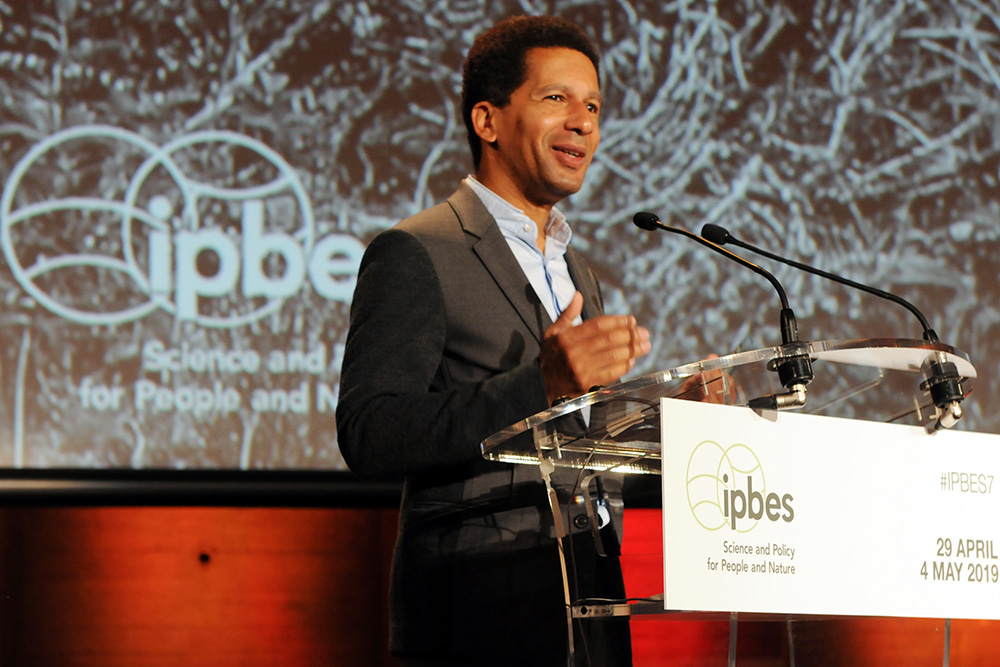
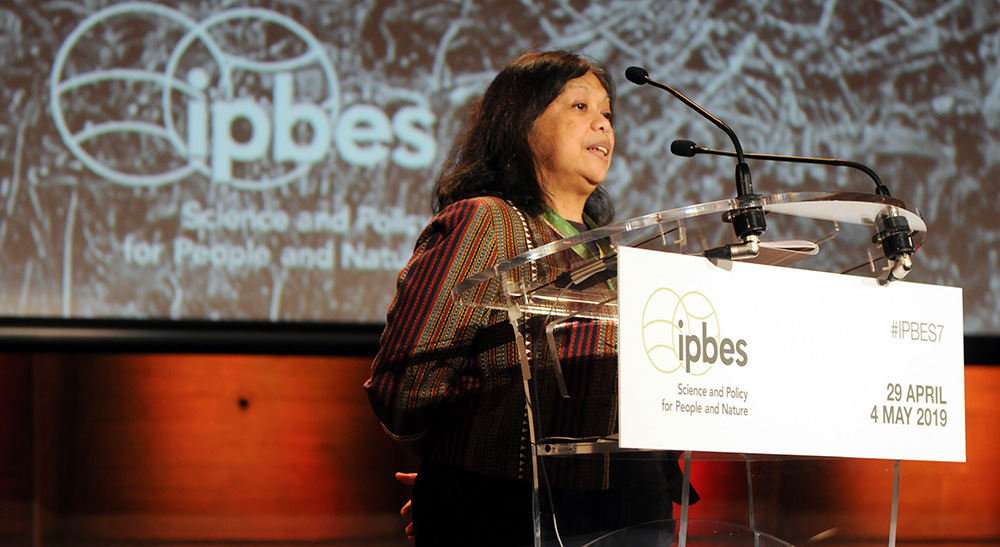
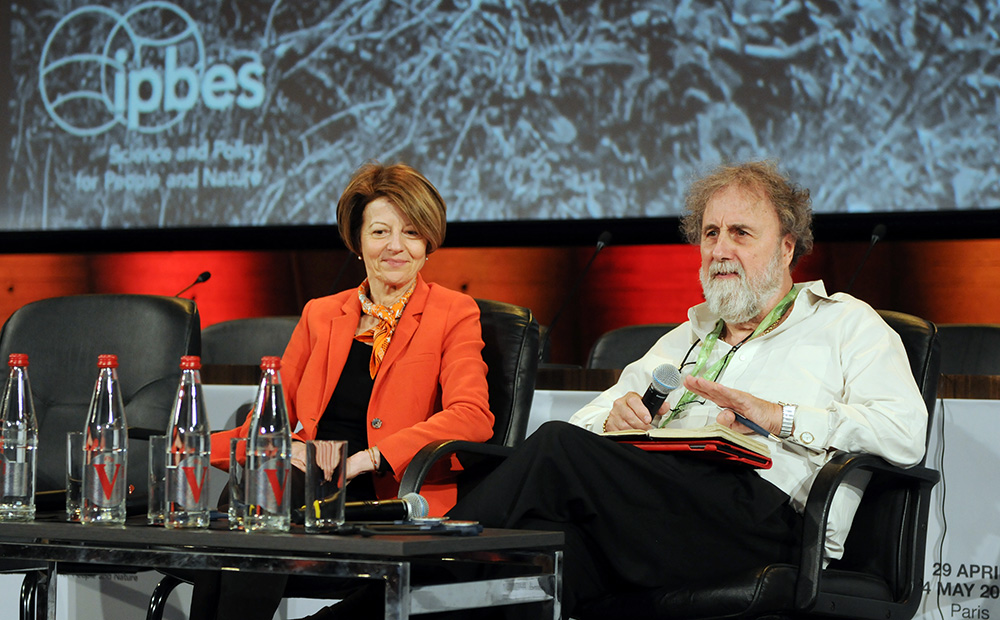
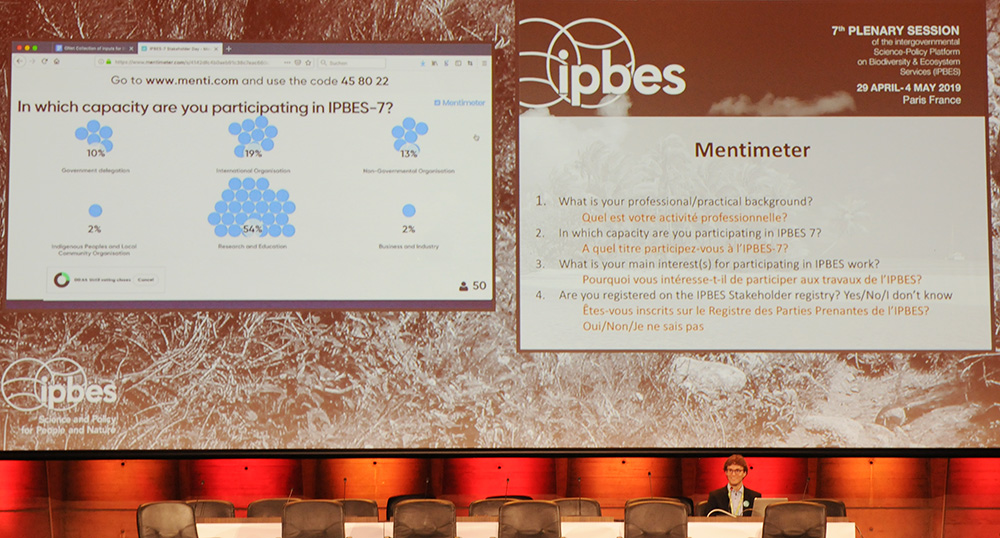
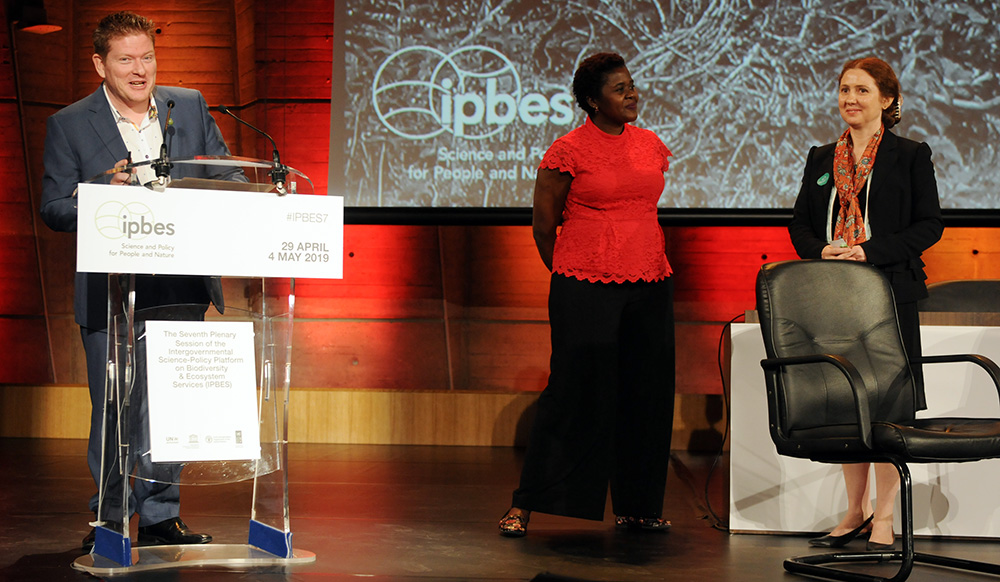
IPBES Resources
- IPBES-7 Website and Documents
- IPBES-7 Provsional Annotated Agenda
- IPBES-7 Resources
- IPBES Global Assessment Preview
IISD ENB/ENB+ Meeting Coverage
- 2018 UN Biodiversity Conference, 14-29 November 2018, Sharm El-Sheikh, Egypt
- Arctic Biodiversity Congress 2018, 9-12 October 2018, Rovaniemi, Finland
- 13th Session of the UN Forum on Forests (UNFF13), 7-11 May 2018, UN Headquarters, New York
- Stakeholder Day and IPBES-6, 17 and 18-24 March 2018, Medellín, Colombia
- 12th Session of the Conference of the Parties to the Convention on the Conservation of Migratory Species of Wild Animals (CMS COP12), 23-28 October 2017, Manila, the Philippines
- 13th Meeting of the Conference of the Parties to the UN Convention to Combat Desertification (UNCCD COP 13), 6-16 September 2017, Ordos, China
- UNFF12, 1-5 May 2017, UN Headquarters, New York
- Previous Meetings of the IPBES Plenary and Negotiations for an IPBES
- Meetings on an International Mechanism of Scientific Expertise on Biodiversity (IMOSEB)
IISD Resources
- BIODIVERSITY-L - A Mailing List for News on Biodiversity and Wildlife Policy
- SDG - A Mailing List for News on Sustainable Development Policy
- SDG Update Newsletter - A compilation of news, commentary and upcoming events published on the SDG Knowledge Hub
- SDG Knowledge Hub - An Online Resource Center for News and Commentary Regarding the Implementation of the United Nations’ 2030 Agenda for Sustainable Development, including all 17 Sustainable Development Goals (SDGs)
- Linkages Update - International Environment and Sustainable Development News